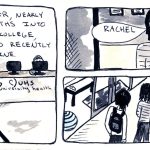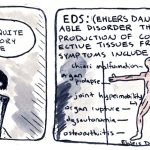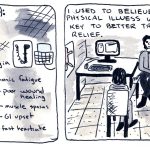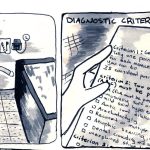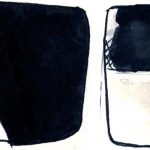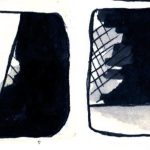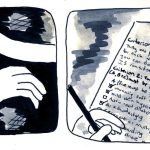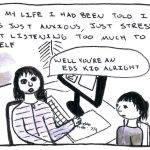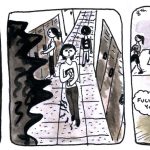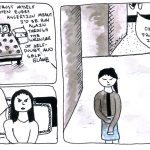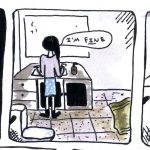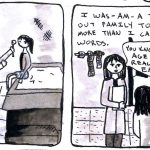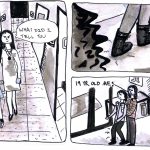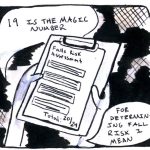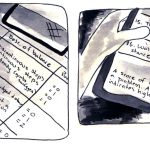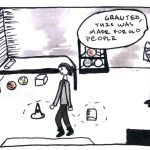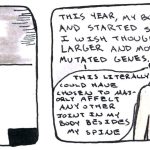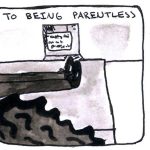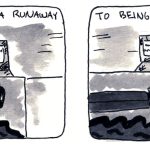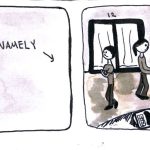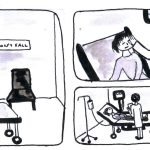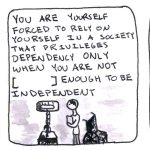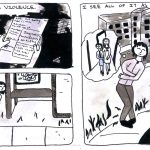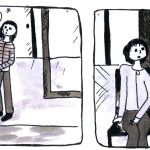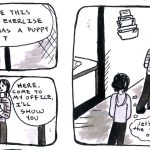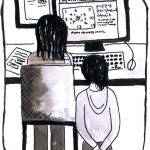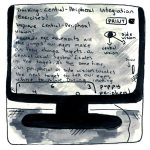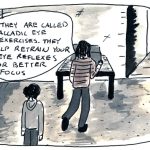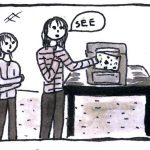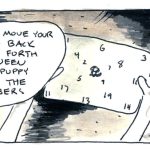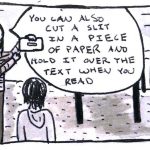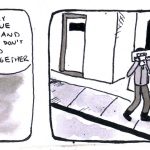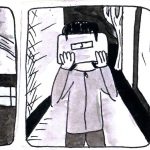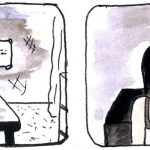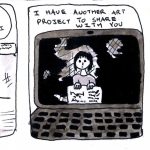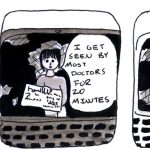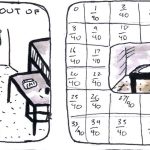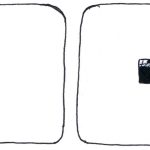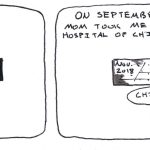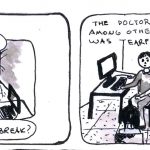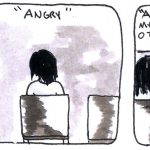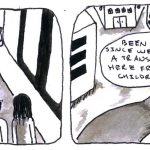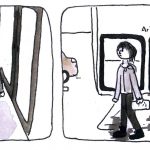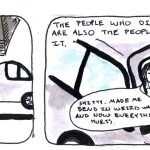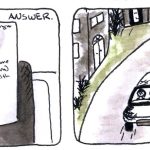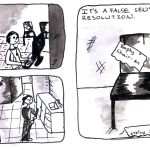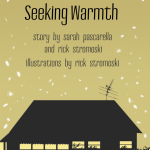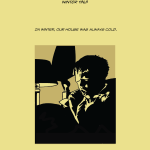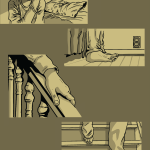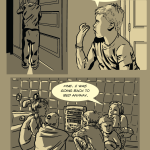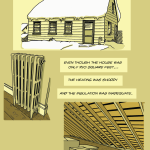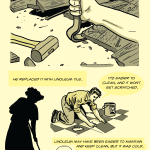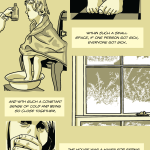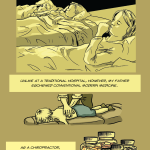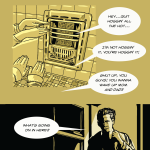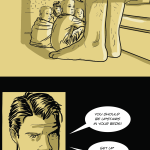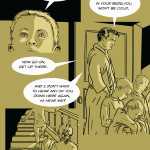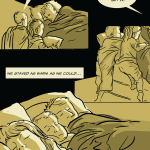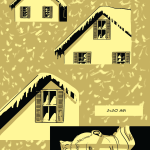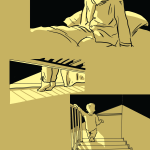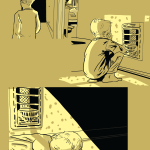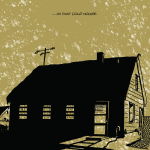Tag: Aquifer: The Florida Review Online
Forthward: Guy Psycho and the Contemporary Epic
Guy Psycho and the Ziggurat of Shame by John King
Beating Windward Press, 2019
Paperback, 206 pages, $17

Epic heroes are traditionally paragons of the societies that invent them, extolling the virtues that those societies find most desirable. Guy Psycho, aging rock star and titular hero of John King’s debut novel, Guy Psycho and the Ziggurat of Shame, is no exception in that regard. He’s a hero for the postmodern era, and so he’s somewhat different from his classical counterparts: He’s tall and thin, in black lipstick and eye makeup. He wears Wayfarers and wingtips (size 14). He has a surgically implanted voicebox that occasionally goes on the fritz, causing him to blat certain syllables with a tinny, synthesized version of his otherwise golden pipes. And, far from being the sole agent of fulfilling his quest, he gets through most of his adventure due to the unfailing support of his band mates: from the musicians, to the discretely differentiated backup-dancing Postmodernaires, to the band’s new manager and accountant. Their adventure, like their professional lives, is something that they all do together.
The book doesn’t only evoke epic literature stylistically and thematically, but literally. The story itself is a wild romp through the tablets described in The Epic of Gilgamesh, as Guy and the crew are plunged into a dreamlike prehistory in search of the lost thirteenth tablet, which they have to find before an angry Ishtar and the other Sumerian gods destroy the world. King lovingly deconstructs the larger-than-life deeds of the original Gilgamesh and gives us a different, almost surreal reinterpretation—or, really, a reiteration—of them.
Along the way, he relies on several distinct elements of each character that quickly become their own sort of nods to traditional heroic epithets: Guy Psycho of the size-14 wingtips and Gaultier gauze, Lulu of the auburn hair and motorcycle boots, Trudy of the black ringlets and silver-ruffled party dress. This also helps further differentiate the various characters (there are eighteen) in a relatively short amount of time, as all of them are far more complex and interesting than they initially appear—the musicians are more than the instruments they play, and every single one of the Postmodernaires has something more than mere dance steps that informs their voices and characterization.
Despite the book’s clear love for the classics, the rest of its presentation is a playful, joyful rejection of convention, as King enjoins the text itself to participate in the narrative. Pages go black as characters are plunged into darkness, punctuated on the next page by cones of onomatopoeic flashlight. Lines of narration from characters lost in a maze spiral around the page in neat right angles, helping drive home the sense of uncanny disorientation. Far from seeming distracting or gimmicky, this quintessentially postmodern acknowledgement of the text as an ontologically distinct artifact reminds the reader to enjoy not just the book, but the experience of reading the book. King includes small moments of explicit and implicit intertextuality, as well, that drive home the point that the book doesn’t exist in a vacuum; the astute reader is rewarded for Googling the serial number on the otherwise nondescript crate in Mr. Youngerman’s curio collection, for example, or for noting the title of the book one of the guests at the Bull of Heaven’s party is reading (which, with any luck, is the tacit promise of a sequel).
The language, too, at the sentence level, is a melodic free-form jazz of excellent description, fluid and rich in metaphor, that whisks the reader effortlessly along through the book’s two-hundred-or-so pages. For example, during a reminiscence, Lulu, a Postmodernaire with a background in archaeology who helps guide the crew through ancient Mesopotamia, reflects on when she hit rock bottom:
Lulu remembered, in a single flash, a time when her face was mashing her nose down against a tabletop, her sweaty, auburn hair crawling with sticky airs, in some murmuring necropolis of a bar in the underside of Tangiers. . . [H]ere she was, across the globe, a cipher in a ledger that no one would ever read, an empty egg cracking in the back of the fridge.
The visceral detail, the vibrant verbs, the fresh and interesting figurative language—all are typical of King’s prose throughout the novel.
In addition to the quality of the language, the passage above also illustrates one of the things that makes the novel work so well: while it never loses its spirit of fun and adventure, King isn’t afraid to treat his characters seriously, to let the reader in on their doubts and vulnerabilities. The nagging problem with many of the ancient epic heroes is that they were portrayed with precious few real faults, few true weaknesses, save a near-ubiquitous hubris. This worked for the societies who birthed them, who seemed to desire these larger-than-life supermen. Guy Psycho and his coterie, however, are products of the contemporary (or postmodern) age, so a big part of their heroic nature comes from their courage in the face of their own faults and personal tragedies. The result is a story that not only has a harmonic resonance with the ancient adventure tales—in a way, the forebears of the craft of fiction itself—but a story that still has a melody all its own, that doesn’t hesitate to march “Forthward!” in an attempt to excavate a new niche in the bedrock of myth—and turn it into a rock-and-roll stage.
Two Poems
To My Caring and Worried Mother
There are sliced carrots in the shape of a cowbell,
because I understand
that great food should sing to you.
There’s a movie we’ve never seen before
and a Japanese instruction manual.
There’s a novel about Alzheimer’s
and some magic memory pills for your mother.
There’s an automatic food dispenser
so you don’t have to bend down to feed the dogs anymore.
There’s a travel bag with a Bible
and a plane ticket to Paris.
There’s a color-coded flow chart
describing the best way to carry a conversation with Grandma.
In the bottom right hand corner, in fine print, it explains
you may have to adopt new tactics on the fly.
I caught Grandma watching
The Hulk in Spanish today.
I just flipped to the English version.
To my caring and worried mother:
raising your voice won’t help,
there is no cure.
All the Post-It notes
on all the cabinets
should say: open with caution,
eat with intensity,
remember,
we love you
and we’ll help you
find the watch
you stuffed in the cookie jar.
Elegy
The horse
nuzzles the back of my hand
as if the damp home of its nose
could stand not one more dark
second of this unfettered freeze.
What of it,
she asks after we’ve had our hot
meat and stale versions of drug,
sitting in lotus pose
facing my grandfather’s headstone
where every engraved sentence
curved tinsel of truth
into the steaming mouth of myth.
This barrel-bellied man
made a small southern town
seem like a place God had visited
and forgot to bless.
He was that damn bold,
that unforgettable.
Before & After the Pinnacle of Happiness
The Truce: The Diary of Martín Santomé by Mario Benedetti
Translated by Harry Morales
Paperback, Penguin UK, 2015

“In only six months and twenty-eight days I’ll be in a position to retire.” So begins Mario Benedetti’s The Truce—a novel that takes the form of the brief and intimate diary of the forty-nine-year-old Martín Santomé, a Uruguayan widower living in Montevideo in the 1960s. Martín’s attention to life’s mundane details, like the shapes of strangers’ legs and his coworkers’ nervous sneezes, combined with his frequent accounts of exhaustion, are what make him feel real and familiar right away. Although his world is small and provincial, his reflections are universal.
The novel was originally published in Spanish (Editorial Nueva Imagen, Montevideo, Uruguay ,1960) and was published in English by Penguin UK Modern Classics in Harry Morales’s English translation in 2015. Readers should be grateful to Morales for not only capturing the contradictory nuances of Benedetti’s resigned-yet-open voice so perfectly in English—but also for inviting a wider audience to enjoy this timeless story of love and sorrow. The translation in today’s context gives the novel a fresh, new meaning. The novel is about learning to appreciate the present, but the way in which it approaches the present is charmingly old-fashioned.
Early on in the novel the protagonist’s daughter, Blanca, laments to her father, “Sometimes I feel sad, over nothing more than not knowing what I’m missing.” The girl’s sentiment is one that hardly exists today. On the contrary, modern readers tend to be acutely aware of what we are missing; we are inundated with online images and texts that remind us of what-could-be on a daily basis. It’s amusing to think that the very reality we have now is what Blanca might have been yearning for. Yet it’s precisely this feeling of Blanca’s desire—a desire her father also shares—that serves as the emotional premise for the entire novel.
The novel embodies the thrill one feels when finding something he never even knew could happen. It’s about the retrospective discovery of a hole—a discovery made only after that hole has been unexpectedly filled. In the case of our protagonist, this hole is romance. Romantic love is the last thing Martín Santomé expects or even wants to find. He is tired. He seeks only leisure and some rest, yet at the same time is depressed by the prospect of a blank agenda. The love affair he begins with his twenty-three-year-old assistant, Laura Avellaneda, just before he enters his retirement, is hardly original. But it’s the way in which this experience moves and reinvigorates him, that is so potent and inexplicably memorable.
Martín’s celebration of his own surprising happiness is made all the more intense by his keen acknowledgement and understanding of the fragility of life and its transcendence. In a small moment midway through the novel he narrates:
She had got out of bed, just like that, wrapped in a blanket, and was standing near the window watching the rain. I approached, also looking at the rain, and we didn’t say anything for a while. All of a sudden, I realized that that moment, that slice of everyday life, was the highest degree of well-being, it was Happiness. Never before had I been so completely happy than at that moment, but still I had the cutting sensation that I would never feel that way again, at least at that level, with that intensity. The pinnacle of happiness is like that, surely it’s like that.
Martín Santomé’s unexpected bliss is poignantly balanced with an underlying fear of loss: “Are we burning?” he asks his lover. The novel beautifully explores the frightening contradictions that are inherent in love, and it’s easy to see why the book still stands as such a revered classic in Latin America, and why it deserves to be read everywhere else. Harry Morales’s translation of La Tregua is a novel you will read without stopping and will never forget. It will be a physical experience that marks you, twists you, and pulls something out of you. It will make you weep and narrow your eyes at details you’d never before noticed: the wood of a table, a dog outside a window. It will make you think about your own emotional life like a chart on paper: where do the peaks and the valleys lie? And, most importantly, what happens in between them?
Love Like Orange
My father’s love was orange. It could be warm and milky like summer Creamsicles, boisterous and magnetic as a dancing flame, or deep and foreboding as the morning sunrises sailors avoid. Every Saturday morning, he clocked in, arriving at my grandmother’s house at nine in the morning. My brother, Justin, and I waited at the front screen door, fidgeting and rocking in our criss-cross-applesauce positions, my mother standing in another room biting her nails.
We only needed our ears to alert us of his arrival: the slow whir of a car driving past the house followed by the crunch of gravel as it made a U-turn. The barely detectable squeak of brakes as a car came to a stop. The slam of a heavy door closing, the clap of footsteps, and, finally, the chirp of the car announcing the locking of its doors.
Sometimes he arrived bearing gifts of the stuffed bear variety or a chocolate orange wrapped in bright tinfoil that, to us, was as valuable as real gold. And other times he arrived in ghoulish masks to terrify Justin.
“For Christ’s sake, stop being a baby,” he barked in irritation, removing the Alf mask as my brother sobbed and hiccupped from fright.
“He’s only three; of course he’s scared,” my mother cried, stroking Justin’s back.
“You’re always babying him.”
These standoffs between my parents could last for as few as thirty seconds and as long as weeks. Tears could quickly turn to laughter as we climbed the apricot tree, bright green with orange fuzzy polka dots hanging from limbs and littering the grass.
In the backyard, Justin giggled while swaying forward and back in a swing fashioned out of a splintered four-by-two plank and manila rope as course as sandpaper.
“Higher,” he laughed. Our father obliged.
He was ours until sunset when he clocked out just as swiftly as he’d arrived. While walking to his car, we sent him off with a parade of waves, parroting “Bye! Bye! Bye! Bye!” back and forth as if he were leaving for war and we didn’t know when he’d return. The bright orange sky bounced off his car as it pulled out onto the road.
We waved with our apricot-stained hands until his car disappeared down the street. These days escaped us in a blur of tickles and laughs and tears and shouts and sweet coos of love. We would forget almost everything except the tang of orange that sat bitterly on our tongues.
—
My father’s love was indigo, as deep and distant as the continental slope we feared would swallow us whole. Sitting on his shoulders, I levitated five feet and nine inches above the ground, scanning the ocean for whales we’d never see this far south.
“Be careful,” my mother warned, which only instigated him to run.
I bounced on his bony shoulders, and then slipped forward and onto the sand. My mother and Justin screamed, and my father scowled, an electrical current of smoky, rich blue pulsating from his veins. Above me, furrowed brows and wide eyes collided, but all I saw were their indigo shadows wrestling on the sand. My mother surrendered, but my father’s palms were stained electric. He stormed ahead of us at a gait our legs couldn’t match.
We called for him: “Wait! Wait! Wait!”
He was too far ahead and could only hear the waves and seagulls, or so he said later. We lost him among the sea of beach umbrellas and Styrofoam coolers and barbeque smoke and waxed surfboards.
On the pier, we had a better view, and we each claimed a direction to survey. We spun around hoping to pinpoint the man with dark hair, dark eyes, and tanned skin. My mother always said he looked like a Greek fisherman, so we looked to the ocean beyond the end of the pier for the dark shadow of a man who’d had enough of life on land and all that comes with it. We felt for his currents of indigo that connected him to us like an invisible leash that tied families together.
“Frank!” my mother shouted.
“Papa, papa, papa,” Justin and I repeated.
And then, as always, he materialized behind us.
“I’m right here; you can stop making a goddamn scene with your hysterics.”
If there’s one thing my father hated more than life among mortals, it was attention from them. We followed him back to the car, our legs marching in double-time to keep up with his long strides. He fought in Vietnam, but the leave-no-man-behind warrior ethos did not apply here. Our feet sunk as the sand grabbed at our ankles, and we hoped we wouldn’t be left behind.
—
My father’s love was cherry—tart and sweet in the same bite. It was layered with unexpected gestures we loved and hated and from which we ran away only to return and beg for more.
On Christmas, we saw life through cherry-stained glasses. Our living room transformed into New York City, with the dozens of crimson-wrapped gifts as its skyscrapers. It took hours to unwrap everything, and when it was over, we hunted for more and painted our father red with tinsel and kisses.
With flushed cheeks and dilated pupils, we ran in circles, incapable of exhausting ourselves. We scrambled up couches like Mount Everest and excavated cardboard boxes for buried treasures, stopping only for a bite of chocolate from our stockings.
“That’s enough,” my father warned us. He was jubilant until he wasn’t.
I always received half a dozen warnings, but Justin was only given two, which was never enough for him.
“That’s two,” my father barked, standing from his seat.
Justin screamed and ran for shelter. When they returned from the back bedroom minutes later, one of Justin’s wrists matched the scarlet of my father’s right palm; it was what inadvertently linked them, like father-and-son tattoos that faded and then returned weeks later.
Justin’s eyes were carmine from crying, and I wondered if everything he saw was the color of Christmas. He rubbed his wrist while I connected the constellation of kisses left behind from my mother’s ruby lipstick that stained his cheek and forehead.
—
My father’s love was white—silent and opaque, hovering in a corner just above our reach. When it wasn’t bright and all-encompassing, it was the very absence of light, siphoning its warm comfort that engulfed us moments ago.
While Justin and I lived with our mother and grandmother in a rugged and familiar landscape of chipped paint, peeling wallpaper, and nail polish–stained quilts, my father lived in a glass castle, off limits except for today.
His house was a museum with carefully placed breakables that toed the edges of shelves. There were white ceramic vases with silk flowers, bronze elephants that, at the right time of day, sparkled under the skylight. There were hand-painted boxes from Russia, miniature Chinese floral vases, a globe made from rare minerals, and a cream-colored bust of Poseidon. They were untouchables we stared at with open jaws and wide eyes while on tip-toes, stroking the invisible barrier that hovered around each one.
We ran in the white glow of this castle until my father’s forty-five-year-old hands caught Justin’s three-year-old neck and forced him to the ground.
“How many times have I told you to be careful? You can’t just run around like a goddamn monkey. This isn’t a zoo!”
His booming voice had the incredible ability to vibrate through our bodies and cause our bones to shake in fear. Justin’s face turned white and, with wide eyes, looked pleadingly at my mother.
Disgust washed over my father’s face.
“Go. Run to your mother.”
“Go to him. You need to go with him,” my mother whispered to me.
I shook my head.
“Go, or he’ll just get angrier,” she pleaded.
I was the only one who could placate my father, a badge of honor I would have done anything to shed. After my father died, these memories felt traitorous. I would spend years repainting my past, searching for new hues, but I always returned to the same four, ending with this blinding white that would never fade.
Refusing to look back at my mother or brother, I stomped toward my father who snarled like a mountain lion in his cave of an office. My brother and mother retreated to a corner, licking their wounds. I cajoled my father with pleas for mercy and, eventually, guided him back to the living room where we lapped up his renewed love like milk.
Two Poems: 2001 & Barbie
2001
There was no space odyssey.
Instead, more than towers fell
in the city where I live.
People were still counting
paper scraps in Florida
for the sake of a flawed process.
People were still dying
in Gujarat’s earthquaked cracks
in Ghana’s stampeded stadiums
and in the summer of the media
calling shark attacks on Santa Rosa
a national security threat.
The Taliban’s advent, McVeigh’s execution
for destroying what seemed an entire city.
I had just turned seven.
For my birthday, my mother
bought me a Beatles CD.
Later that year, George Harrison died—
my favorite one, the one
who sang about how all things must
come to an end. But
how were endings possible
in a new millennium? New
Wikipedia, where we learned
how to summarize. New Nokia,
new Madonna, even language felt
refreshed: A.I., iTunes, OS X, Xbox.
It was the first time I broke my arm
in two separate places. I visited the zoo
and watched the animals roar at each other,
and at themselves. My mother dispelled
Santa Claus, perhaps a year too soon
for my imagination to take. I cried
until I received extra presents
for keeping the secret from my sister.
I saw myself in the Backstreet Boys,
in the highest rated Super Bowl in history,
as Harry Potter, whether philosopher
or sorcerer. Everything still felt possible
to a seven-year-old, who had just
heard about the first tourist in space
and thought it was an odyssey.
Barbie
I comb my hair with a small hairbrush.
I no longer walk in nature. And when
I sit on the front porch, sipping
whatever’s left from the mason jar
filled with all that last night, I flick
the maggots from my skin.
The parked car outside the house
sits with its tarped over cover since before
I remember. I remember
playing dolls with my sister
while my father wedged a football
into my hands, and said
you must throw as far as you can.
Open wide, my arms onto the wheel
where I learned how a man
drives five miles above the limit.
It was cold that first Kentucky,
where I first kissed masculine lips,
wet as leather, chapped the way
we hid from what we learned
in locker rooms. We grazed the sides
of our heads against the Cypress bark.
While we leaned against its trunk, I saw
pigs in the distance, wrestling
in the nightmud. They cannot know
how soon they will be separated, then skinned.
I Wake at Four & Drive to the Mountains
To leave the inner critic on the empty street beneath my windows.
To outride the arrows, or slings at least, of civic life.
To put the forces separating me from my daughter—the moderator
in elastic-waisted slacks, the decree signed
by the liver-spotted judge—in the rear-view.
To look ahead and see the world’s impersonal love song again
lifted from night.
To know the song is about the attention we give the wild,
unfixable everything we love yet is always already
indifferent to us.
And yet to see the sun rise, like a couched friend, from blankets of fog
in the lowland orchards.
To see the fields of our anxieties cut and gathered in silos.
To hear the wind wrap us, undeserving, in the sun’s resolve
to sustain us another day.
To stuff a campsite into my backpack and somehow walk ten miles.
To feel the weight of our basic needs shouldered across streams,
over hills, up crevices.
To remember having walked the home-forsaken trail before.
To realize I’d compressed memory of all this pain—all but the sacrament
of red, gold and orange leaves
above river bluffs.
Only here do I realize I must have forgotten just how many uphills,
just how fucking much elevation hurts.
Here I think such thoughts as our sapiens ancestors ground as many miles
over mountains each day.
I wake and drive and walk to think: Perhaps the downhill mortar and pestle
of our patellae almost crushes recall
of profane elevation.
And to meet the inner critic, somehow already at the top, and
to accept his message:
You wake at four and drive to the mountains
to accept the body’s pain as the cost of all the beauty there is to see.
To My Fellow Submitters
A found poem from sample rejections saved in “My Submissions,”
completed in response to a writing prompt given at
the Sandhill Writers Retreat, May 2019
Dear
Dear
Dear
Our poets’ community is lucky to have you
Good fortune in all your future writing
Declined
Cannot offer
We enjoyed having the chance to read
Many excellent entries this year
The team wishes you
We wish each of you the best in finding publishers
All the best
Unfortunately
The sweat and the perseverance it takes to put together a submission and send it out, naked
Declined by
Not Selected
A strong and competitive batch
A complimentary copy of this year’s
We regret
We are grateful for your ideas
We encourage you to submit again in the future
We are unable to provide individual feedback
Thanks
Best
Appreciate the dedication to craft
Thank you for choosing us
Hope that you and your work succeed in finding a home
You’re now one step closer to getting that acceptance you’ve been looking for
Sincerely
In peace and poetry
The Ball Spun
I arrived at the playground with Armin. It was a late afternoon in June; the rays of sunshine broke through the thick white clouds in places, illuminating patches of the tramped grass. Armin’s parents had sent him another package, a brand-new soccer ball in it. It was yellow with blue spots. He held it close to his chest as we sauntered down the street to the playground.
Armin and I hung out regularly. He lived in my neighborhood with his grandma. Armin’s parents worked in Austria as guest workers. Most of his life he spent with his grandma, seeing his parents once a year. Armin had toys I’d never seen before: remote-operated cars built of high-quality steel, model planes, and handheld video games. He brought to school all sorts of foreign candy, neatly wrapped, colorful, with pictures of cartoon characters.
Armin talked a lot, while I was a quiet type. He talked so much on our way to school that we often ended up being late. When I stopped by his place before school, I’d find him in the bathroom in front of the mirror, looking at himself and combing his blond curls. “What do you think, Edi?” he’d say. “Looking good, man. That schmuck, Sinan, is a goner. Selma is my girl. Hey, let me show you a new thing I got.” He was never ready on time, and the school was three kilometers away—a long walk.
The playground was deserted. We started kicking the ball from one rusted goal post to another. A few minutes later, we noticed a group of boys walking towards us. They were in their late teens. As soon as we saw them we knew we were in trouble. After all, two eleven-year-olds stood no chance against a gang of high-schoolers. Their ring leaders were two brothers. The older brother, Kasim, was as dark as the asphalt on the road he’d just crossed. He was skinny and long—all limbs. His round head bobbed on top of his body like a ball with two black eyes perched above a bulbous nose. Kasim’s brother, Vedad, was a year younger. He had long, brown hair he’d always tie into a ponytail. Vedad was notorious for his vicious smile that revealed two long canines. He was short and sturdy, his legs sinewy and fast. He was the best soccer player in town.
Kasim intercepted our pass and took the ball. Vedad shouted, “Come on, man! Be nice and share.” Kasim kicked the ball hard to the other three boys trudging behind him.
“Give the ball back, assholes!” Armin blurted out, and before finishing the sentence he looked at me, surprised by his own words.
“Whoa, man! The kid’s got a foul mouth.” Kasim sniggered. “Isn’t that Aunt Zinka’s grandson?”
“Time to teach him a lesson,” Vedad said. He picked up the ball like a pro, bouncing it on his knees, his ponytail prancing up and down. “Tell me, little punk!” he said. “Whose ball is this? It’s damn good. Real leather. Made in Germany.”
“It’s mine,” Armin said.
“Of course, little chicken shit.” Vedad said. “Did your mama send it from Germany?”
“From Austria,” Armin shot back.
“Would you, please, give us the ball back?” I interjected.
“This one here is a nice boy.” Vedad nodded towards me and balanced the ball between his foot and his shin.
“Listen, nice boy,” he said. “I have an idea. You get the ball and we let you play if you two show us your kung fu skills.”
“No way,” Armin cried. “You guys will mow the lawn with us.”
“Who said we’d do anything?” Kasim said. “We don’t fight little pussycats. We want you to fight each other.”
“Why would we do that?” I said.
“Because that’s the only way you get the ball back. And if you beat this mama’s boy, the ball is yours. Isn’t that so, mama’s boy?”
Armin looked at me, then at Vedad and Kasim. “The ball is mine,” he said.
I held my gaze on Kasim and nodded hesitantly. As long as I could remember, the only soccer ball I ever had was a bubamara, which meant ladybug. The bubamaras were often the only choice for the working-class kids in Yugoslavia. They were made of cheap rubber and lasted only for a few weeks. After a couple of good games, bubamaras turned into sad-looking, egg-shaped spheres, their innards dangling through the ripped outer layer.
I was bigger than Armin and stronger. Armin was all mouth, that cocky fool. We both knew I could take him out easily. I walked over to where he stood and looked at him up close.
“Let’s do this,” Armin said and jumped on me, climbing on my shoulder. He got me in a choke hold and held me down with all his might. Everybody lined up around us, grunting, yelling, and laughing—Kasim and Vedad in the opposite corners. I steadied myself, not letting him push me down on my knees.
I wiggled out of Armin’s hold and was about to strike him, but Vedad and Kasim grabbed us and pulled us apart. I felt Kasim’s firm grip on my elbows.
“Listen,” he shouted over my head. “You two start when we say.” He shook my whole body as if to reset me and said, “Now you go.”
I was fast this time. I tackled Armin to the ground and shoved his face into the grass. Kneeling on his back, I bent one of his arms backwards and held it tight, twisting and bending it towards his shoulder blades. After a few minutes he stopped wriggling.
The brothers pulled us apart again. Vedad laughed and said, “Man, that was ugly. But fun.”
Gasping for air, I gaped at his wolf teeth. He’d drawn his lips up to his ears.
Armin was in tears. “Asshole!” he screamed at me. “You’ll pay for this.” He ran towards home.
Kasim took the ball in his hands and spun it on his forefinger. “Get lost, nice boy,” he said.
—
Three years later, Armin and I were on the playground again when eight-year-old twins, Mirza and Kenan, saw us from across the field and ran over to our side. They were both dark and so skinny that they looked like two roosters—their noses stuck out like two beaks, their small eyes peered from creased, dry skin. The boys looked like two old men trapped in children’s bodies. They were Roma kids. Their mother worked at the textile mill; their father was rarely around, but when he was home he’d wave at me and smile if he saw me walk by their house. We could never tell the twins apart, but this time one of them had scabs all over his head. His brother had only a few on his neck and elbows. The scabby one was Mirza.
“We want to play too,” Mirza croaked.
“Really, you little toad?” Armin raised his blond brows and smiled. “You want to play with the big boys?”
“Yes, of course,” Mirza said. His brother stood by him quietly.
“What can you give us for it?” I asked. I knew they had nothing to offer, but I liked to joke with them. The twins were dear to me.
“Nothing.”
“How about you put on a nice show for us?” said Armin. “You just have to fight a little, like in the movies.”
“You’re too big for us.”
“No, you chicken shit, you fight each other. The winner gets this ball.”
I looked at Armin askance. I couldn’t believe he’d give them the ball.
“We’re brothers.”
“Brothers fight,” I said.” You sometimes fight, don’t you?”
“Yes, we do. But Mama says if she sees us fighting again, she’ll break our arms.”
“Your mother is getting off work in an hour,” Armin said. “The ball is yours if you win.”
By now, Armin had six soccer balls and counting. His parents had brought him a ball every time they came to visit from Austria. Three years earlier, he had told his grandma about our fight. The day after he told her, I got a whipping from my father. A few months later, after we got over our fight, I asked Armin if he’d gotten his ball back. He shrugged and said he couldn’t care less. He was quiet all the way to school that day.
Mirza looked at his brother. Kenan was still silent. “Let’s do this,” Kenan said and
leaped onto Mirza.
They alternately held each other in chokeholds at first, squirming around like two hungry worms. We pulled them apart. “We’re taking a break,” I said, restraining Mirza from jumping on his brother again. I held him tight in my arms, his scabs close to my face.
“Let them go,” Armin said and pushed his twin into the middle of our circle. I released mine and he lunged ahead. We stepped back and watched them. I glanced at Armin. His lips were stretched into a smile, his foot resting on the ball.
The twins battered each other with their bony fists. Their knuckles found their heads and faces. Soon they both were bleeding. Kenan’s lip was cut open. Mirza’s nose was oozing blood. I ran over to Mirza and yanked him away. The scabs on his head were cut open and bloody too. He left red streaks on his brother’s shirt. They both were crying now. “I’ll kill him! I’ll kill the bastard,” Mirza hissed through tears and blood.
I pulled up the hem of Mirza’s shirt to his face, took his hand, and pressed it on his nose to stop the bleeding. In a calm but threatening tone, I said, “Go home, right away, before I beat the shit out of you.” His brother held his lip and mumbled something about cracking Mirza’s scabby head open. Mirza started running. Kenan scrammed after him. They both ran towards their home, their shirts torn and bloody.
I turned to Armin. His mouth was agape, his lips moving, but there was no sound. I looked down at the ball in front of him. It was unblemished, sparkly white with black spots and a large Adidas sign on it. An intense burn welled up from the pit of my stomach. I sprinted towards the ball and kicked it with all my might. The ball soared high into the broad blue sky.
Things You Left in Accra before Moving to the Bronx
Grandma and her weak leg,
your sister at 18, still with one good iris,
your mother’s British jewelry hidden under the bed,
the places in the carpet you soiled with urine,
all the red dust,
your seat at Calvary Methodist Church next to Marie
who’d always chat with you when someone talked
about Jesus and his power to bring you all the things you needed,
your gymnastic booty shorts (your mother sent
them from America because the heat in Accra overwhelmed
you but you still wish you’d saved some for America’s winters),
warm Tea Bread sold at the YMCA between 6:30 am and 7:30 am,
the scent of air conditioning and ice cream at the SHELL gas station,
Grandma with her good English,
Mercedes and Pamela, your neighbors who borrowed everything from salt to ladles,
Asaana, Yooyi, Aluguntuguin, Nkontomire,
Living Bitters, Mercy Cream, Lion’s Ointment &
a Saturday listening to wind turn on pawpaw leaves.
Two Writers at Alligator Point






Poet, essayist, and publisher Rick Campbell and nonfiction writer Bob Kunzinger have published a combined fourteen books. Campbell’s include The History of Steel, Setting the World in Order, and Dixmont, many poems in countless journals, and for more than twenty years he was the publisher at Anhinga Press in Tallahassee, Florida. Bob Kunzinger’s volumes include Borderline Crazy, Penance, and Fragments as well as hundreds of works in journals and magazines, including several notations by Best American Essays.
Now both have new books from Madville Press of Texas. Campbell’s Gunshot, Peacock, Dog premiered last fall, and Kunzinger’s A Third Place: Notes in Nature in August of 2019.
These two old friends—both writers and professors with a penchant for sharing their wisdom—sat down for a chat about writing:
Kunzinger:
I always found the relationship between poetry and memoir to be closer than either of those and fiction. That’s why I think you find many poets writing essays or other forms of memoir, but not too many fiction writers (though I can suddenly recall many) who bother with nonfiction, or even poetry. I have an easier time reading poetry than fiction because it sends me back into my own senses, and I like that.
Ironically, I’m as influenced by poets as I am prose writers. You’re both, so there’s that. In fact, I enjoy your poetry, for which you are known, but I’m especially fond of your essays—the two in History of Steel are among my favorite nonfiction prose. Who influenced you, do you think? Where are you more comfortable?
Campbell:
I have no interesting answer, no matter how many times I am asked. In poetry, Richard Hugo, James Wright, Philip Levine. I’ve read and liked, even loved, hundreds of poems, but those three poets influenced me the most because I read them first, when I was poetically young. It’s possible that I have been more influenced by Bob Dylan and Bruce Springsteen and so many song writers than I have poets. I am a listener. For years I have listened to music far more, for far more hours a day, a week, than I read poetry. I hear music and rhythm more than words. I am, I believe, more moved by songs than poems. I am a poet because I wanted to be a songwriter.
Kunzinger:
I think that’s why we are very much the same when it comes to influence, and even a bit with my short prose and your longer poems. We were both musicians at some point—you still are—and the music of our youth was as much our literature as Salinger or Hemingway. For me, early Springsteen, Jackson Browne, Dylan. If I’m screwing around with a longer piece and listen to Neil Young or Browne’s “Sky Blue and Black,” it’s like getting a hit of something that fires me up.
Campbell:
I suppose I am more comfortable as a poet, but identity is a strange thing for me. For many years I think I was better known as a publisher than a writer, and I kept wanting to tell people I’m a writer too. I spend more time thinking about and writing prose than poetry, even though I’ve published six books of poetry and not even one prose collection. I don’t think about poems—I get an inspiration and I write a poem. I never say I’m going to write a poem about ducks or love or something. Poems come quickly, and then it’s over. But I do think about and sketch prose ideas. I have about thirty essays that are finished or nearly so, and it’s taken about twenty years to get this far. If I start a poem, for whatever reason, I write it in a matter of minutes. I don’t bend it or play with it. I don’t even think of it as narrative, as if it’s going somewhere. It’s a bubble that rises over my head like in a cartoon. If I have a prose idea it usually takes longer to be born, but prose ideas go into one box and poetry into another. They don’t get mixed up. Sometimes I might take a finished poem and expand it into an essay, but rarely.
Your flash prose pieces and my longer poems often have much in common. I think your work and mine tends to move horizontally—sliding and leaping from subject to subject. I think it’s called accretion. We layer ideas, but more horizontally than vertically.
Kunzinger:
I am not sure the material is horizontal—maybe in as much as there is some recognizable narrative arc in many pieces—but I think of the tangents within a piece as the real work more than the apparent direction. What’d you call it? Accretion? I tend to think of what we both do in writing as “digression.” I like the digressive nature of some of the pieces—“Flip Flops,” for instance, where the direction of the piece turns out to be little more than a vehicle for the deeper purpose. I think Tim O’Brien does that best, but I think he stole the style from Ernie Pyle, or maybe Czech writer Bohumil Hrabal.
Campbell:
I think I mean that our subjects are layered in a way that one idea isn’t privileged over the others. No dominant idea with the others subservient. Not much hierarchical structure. Your essay “Sliced Bread” does that. When I still used to workshop my poems, I was often told that I had too many subjects. I think that’s not possible as long as I leap and land properly. You and I think in associations and see lots of connections. This might also be why I have trouble finishing essays. Why or when should I stop leaping? It’s a process of montage. a palimpsest, a highway built over a trail, a road that follows a river. Accretion and digression might be the same thing. Tangents, too, but they go toward the essential subject not away from it.
Kunzinger:
I had to look up “palimpsest.” But, yes, exactly. The tangent is the point to begin with. I guess we layer ideas. That’s why I like longer pieces. I can layer it to the point where people will find more to relate to. It is hard for me to do short work. My short prose was developed for the sole purpose of reading to an audience, and some of it has been published, but they were meant to be read in the amount of time it takes to read a two- or three-page narrative poem, so that when I read with poets we’d share the same amount of time. What that did, though, was teach me the art of diction. I reached back to my journalism roots for that and stole from poets like Tim Seibles and Richard Lax. But I’m still way more comfortable in weaving ideas in longer form. That doesn’t mean it always works! Can you tell? I mean, how quickly can you tell if something’s working?
Campbell:
If I finish a poem, then it works. If it fades out partway through, then it’s over. I don’t go back to it. We have music in common and probably also that we never intended to be scholars. I saw my college studies more as vocational school, and my vocation was to write poetry.
Kunzinger:
My vocation is still to be determined. Our “occupational hazard” being that our occupation’s just not around.
Campbell:
Did you ever hear of the JBACC—the Jimmy Buffet Air Conditioning Club? It’s cooler than a fan club.
Kunzinger:
Oh, shit.
Campbell:
Back to writing. I very much give a shit about being read. I like to publish, and I like to have readers. Maybe I don’t care as much anymore about being famous and making it. Does that make us defensive of our work? As in we might still think we have not received the recognition the work deserves? If any?
Kunzinger:
I used to wonder or worry where I fell in the scheme of writers. I’ve published a lot, but I usually feel that is the result of their being not a whole lot of nonfiction writers out there compared to poets and fiction writers. Also, it might be subject-related. I might be the only one writing about Siberia in short form. I don’t know. In the few workshops I have taken, my work was always slammed. I know there are some “subjects” which are going to work and some which I write just for me. But the pieces which get the most attention are the ones that have universal themes buried in some digression. That light went on about twenty years ago when I was at lunch with Tim Seibles and he happened to read something I wrote which I had with me, which is unusual since, like you and me, he and I generally never talk about writing, and he tossed it back to me and said, almost off the cuff, “Don’t show me your pain, Bob. Show me mine.” It was like he flipped on a switch. My writing completely changed then or, I should say, found some new level, and I started not worrying about where I fit in the writing world; I just wrote.
But I can’t avoid the comparison thing. Sedaris still pisses me off. We both did an identical themed piece, his about standing in line at Starbucks and his impatience, and mine—written a few years before his, I might add—about standing in line at a grocery store with no ability to make small talk (“Small Talk”). His stays in the impatient mode whereas mine digresses into memory and something else. How can I not look at the success of his and wonder what I can do differently so the work gets more attention? I simply prefer that first thing we talked about—a piece not be the point of the piece—if that makes sense.
For instance, I love your idea that it doesn’t matter how many “subjects” are in a piece so long as the leaps from one to the other work and the reader lands with us. For me, though, I’ll hit a dead end about, say, geese, but then a few weeks later—or a few months—I’ll be working on the fifteenth piece since the geese one and stumble upon a concept—say people who follow others without understanding where they are going, or the players on a baseball team who spend the better part of their careers on the bench, making a living but ultimately not doing what they planned to do when they were in Little League, and I’ll remember the geese and somehow marry the two.
Campbell:
Richard Hugo wrote about the triggering subject and the true subject; that we need to give up the triggering subject when the true subject shows up. Funny, I think he used geese in his example, too. But as for my insecurities, yes, I still have them. Now that I am older, I tend to worry about the lack of offers I get to headline conferences or compare myself to those who seem to have plum positions in MFA programs. I’m a working-class late bloomer who “chose” to spend his academic/writing life at a small college in a small town. Sometimes I feel sorry for myself, and then I hope I realize that I am doing that and try to get over it. That’s where music, baseball, and fishing come in handy. A poet friend once wrote that I was the best poet few readers had ever heard of. I guess that’s a compliment. All whiny shit aside, I think a lot of my poems and a few of my essays are as good as any other writer’s. I don’t want to be better than other writers, I just want to be good. At this point I should just say “so it goes.”
Kunzinger:
Vincent van Gogh is my inspiration for not worrying about what others think, which can be frustrating when I attend readings where people are paid thousands of dollars, and their work, in my not-humble-enough opinion, is not as good as ours, and our publishing record is so much deeper, and I wonder how the hell do I get gigs like that? Van Gogh painted for himself, completely and unapologetically for himself, to the point where other painters and critics called him a bum and a waste of space in the art world, but he persisted, confident he knew what he wanted to do.
But I still wonder if I’m too simplistic, the writing equivalent of knowing the three chords from which you can play any pop song. It is popular, but it has no staying power. And I fear I finish too soon, in the piece I mean, not time-wise.
Campbell:
Finished is a weird thing. I say a poem’s finished when I feel it’s as good as I can make it. Then I might let it sit a little while longer before I think it’s ready to send out. But the essays baffle me; they are harder to finish, maybe just because the more words, the more possibilities. My real problem is that I forget that I have essays to send to journals. Even if I spend the good part of a day sending out poems, I will forget to send out the essays. Is this some Freudian lack of confidence? Did Freud ever talk about this? My knowledge of Freud is just some shallow pop-culture reading.
I was never diligent about sending work out. I also know that I have never worked hard enough, never hustled enough, to garner fame. I don’t work as hard as you do. I respect how much you write.
Kunzinger:
Yeah, I am better than you. [Laughs.]
Campbell:
This is my virtual porch.
Kunzinger:
Seriously, I still hesitate a long time before actually sending something out. I’m always fighting the triteness. I have to go back and “get the trite out,” as I like to think of it. That reminds me of the idea that Rupert Fike told me once that an ending must both be a complete surprise and totally obvious at the same time. I’m okay with ending. No, for me, it’s when I start that I struggle to find something familiar but not at all trite. I can conceive an essay okay. It’s not unusual for me to stumble across one moment in my day, maybe in conversation with someone, or something I overheard in a hallway somewhere. “Flip Flops” started like that. The piece all hangs on one line the doctor said to me at a check-up: “It’s a good thing you whacked your ankle.” I had no idea where I was going in a completely separate piece about 911 until that line, and I joined a stale work with a new direction. Sometimes, though, the direction is so obvious.
Campbell:
When we are nonfiction writers, we promise to tell the truth as well as we can, given the limitations of memory and vagaries of time, given the influx of new information. I am thinking about when you found out that you had Italian ancestry and then saw your “new” family name on a building in Tampa. Actually, I think I saw it first. Discoveries like that change what we know and maybe what we have written. But poetry is neither true nor false, not fiction or nonfiction. I mean it is or can be one or the other, but there’s no rule, no category. There’s no nonfiction shelf for poetry. And yet readers, despite often having a high level of poetic sophistication, assume that a poem is “true.” They want poetry to be autobiographical. Most of my poems are, and I assume that lures readers into thinking that all of my poems are true. I guess that’s the readers’ problem not mine.
Kunzinger:
If I’m reading or writing journalism, I expect absolute adherence to some form of objective truth; that is, verifiable information. But as a nonfiction writer—which is such a huge term covering everything from personal memoir to documentaries, and as a term literally means, simply, “What I’m writing is not fiction”—I find a massive gap can exist between “truth” and “accuracy.” In my Siberian essays, I can guarantee—that is prove—the “truth” of the pieces in that I was on the train with my son heading east toward the other side of the country. The people I met are all real, the stories of almost missing the train, as well as the floods on the Amur River, are all real, but I can’t guarantee accuracy. I don’t remember the conversations word for word or if they were in the day or at night or sometimes exactly which station we were at when we bought dried fish, but the essential narrative, a father and son traveling across Siberia together, sharing these experiences, is true, because that is the point of the piece; I’m not writing a guidebook.
I was reading some of your unpublished essays and I was not concerned with how accurate you were as to which highway you were on—I’m never going there—or when it was, and even the details of what happened; my focus was on the truth of the “spirit” of the places, and the nonfiction elements of remembering. Poet JT Williams described my work as, “This is a bunch of shit that happened to you and how you best remember it all these years later.” I think that’s an accurate definition of the truth. Tim O’Brien still has the definitive explanation for “truth” in insisting something that “seemed” to happen is often “more true” than what really happened, even though the accuracy might be questionable.
Campbell:
What I find interesting is trying to tell the truth, to be honest, in nonfiction. I write a lot about how what I remember might not be exactly what happened. I try to be honest, try not to lie, but it’s clear to me that capital-T Truth is often not attainable.
You are more of a nonfiction writer than I, and you were trained in journalism, so how do you feel when accuracy and truth prove to be elusive?
Kunzinger:
I do my homework; I try and unearth the validity of what I’m writing, but if I keep reaching various “truths” because the foundation of what I’m writing is already subjective, I let “accuracy” go and just lean back on personal take.
My Siberian work takes place in Siberia, but it is about fathers and sons, about sacrifice and journey. It was the ultimate metaphor—my son and I on the same train going the same distance across an unknown wilderness, and his perspective is different than mine, which I tell through letters to my father. That isn’t a travel essay, I don’t think, nor is my work on the Camino or in St. Petersburg. If someone asks me what I write about, I don’t think of myself as a travel writer—the new book from Madville, A Third Place, is about nature, but it isn’t a guide. Ian Frazier and Colin Thubron both wrote extensively about Siberia and, honestly, their books aren’t guides either. That is why I left journalism. A journalist would write a guide; an essayist such as myself writes about the spirit of place, and a poet, well, they just ride the train into the distance and someone else writes about their death. That’s Russia.
Campbell:
I agree completely with your take on your writing: your memoirs are framed by travel. Travel is, metaphorically and spatially, your vehicle.
When my essays overlap with my poems, it’s almost always that the poem came first. Sometimes years before the essay. Those poems are often more narrative than lyrical (though I don’t really believe in or understand a hard distinction). The poems are condensed, and the essays are expanded, but the subject is the same. Sometimes it’s a travel topic but more likely it’s about family. Family is such a twisted and complicated subject that the poem, even a series of poems, just sometimes does not allow me to say what I want to say. There’s an essay that was in The History of Steel (and first in Kestrel) about my father’s death that is clearly an expansion, or a gloss, of a shorter poem from some years before.
I like to make a distinction between true and honest. I want my work to be honest—either as true as I can make it, or an honest attempt at accuracy. And, yes, the spirit of the work is the most important element. Still, I do like to get the highway numbers right. I have an essay, “On Not Going to Vietnam,” in which I claim this guy I met got #2 in the Vietnam War draft, went to war, and might have died. I accidentally found out twenty years or so later that he did not do any of that. I was being honest, though, it turns out, very, very inaccurate. The last part of my essay explores how I might have come to believe these inaccuracies, but I can’t even explain that.
Kunzinger:
When we discuss memoir vs. travel essays, we both seem to lean toward the memoir side, and the sense of place is important, but only in as much as it serves as a foundation for something else we respond to. A Third Place is a compilation of short essays, mostly in nature, but not about nature; most of the writings—particularly the digressions—were not conceived together. I heard an interview with Billy Joel, and when asked about “Scenes from an Italian Restaurant,” he said the three different parts to that were written at three different times and none with any thought to being connected to the others. It was only later that he found a common thread and tied them together. I write like that. So if I “finish” a piece about missing a train in Russia, I already know in the back of my mind I’m going to write something else later, or maybe already have written it, that at some point I’ll realize would make a good fit for it, and then go back and tie them together or, sometimes, lace them. Often, I find the “truth” of the piece later, after the bulk of the “narrative” is complete. When you found the truth about the dude who didn’t go to Vietnam, it sounds like you thought you needed to explain yourself to the reader, like some Waltons epilogue—“Mary Ellen eventually moved to Richmond and is living as a prostitute.” I think what really happened to the guy not going to Vietnam is irrelevant—in that essay anyway. Maybe another one later will be solely about that. Tim O’Brien does that. I love reading his essays which later became parts of books—like those in “The Things they Carried.” If you read them carefully you see some significant differences between the original essay and the form it took when complied with other essays which he wanted to somehow connect. I see that in your work too.
Campbell:
Did I ever tell you my O’Brien story? It’s the late 1980s, and my friend and I drove up to Augusta, Georgia, to hear Tim read. We didn’t leave till after noon, so we had to bust through rural Georgia. We got there just as he was being introduced and made a commotion by trying to come in quietly. My friend Judith Ortiz Cofer was hosting the reading, and after Tim was done she took us up to meet him. I was worried about how road ragged I looked, but Tim, as always, looked just as ragged. As we were talking, a man came out of a room behind us, and Tim says, “This is my friend Kiowa.” I just stand there looking dopey and then say, “Man I thought you were dead.” Kiowa shakes his head and says, “It was fiction.”
O’Brien intentionally blurs the line between fiction and nonfiction, and he certainly twisted me up. We have yet to mention the New Journalism. As in Norman Mailer quoting the inner thoughts of Gary Gilmore that he could not have possibly known. Mailer, Truman Capote, Tom Wolfe changed what we can say in nonfiction forever.
I used to tell people that I didn’t write fiction because the only character I am interested in is me. Then I blew it and published a short story about a kid nailing his father to a cross. I didn’t like my father, but, God, I never crucified him.
Kunzinger:
I have no fiction DNA; it’s that simple. Tim first wrote If I Die in a Combat Zone, which is the nonfiction predecessor to the stories in The Things They Carried, which he wrote about twenty years later. I can’t even pull that off. I was in a fiction seminar once with Sheri Reynolds, and we had to write a fiction story—I wrote about a twenty-four-year-old who worked in an exercise club and the people he met, which is completely me. It sucked. When we went over my piece, the other people in the seminar crucified me!I left and drank something like four margaritas that night.
Like now. See, this is why I hate talking about writing. I just remembered just how bad I can be at it. Dammit. Let’s get some oysters. Damn. Let’s get some beer.
Summer III
Across the forest, we sit
in a deer stand shaped like a heart.
A cry comes from the center of the woods
like wind blowing through a doll’s head.
There are birds that come out at night
just to be devoured by other birds.
I can’t make things happen faster
than they’re going to happen.
I know that now.
If your thick arms come out
of the shadows only to light smokes
or hold my hand expertly in yours,
I need to accept it.
when I stopped fearing ghosts
I learned about ghost hunting from my mom. When I was in elementary school, she drove me down to Louisiana every summer, and we’d stomp around the boggy summer heat in old cemeteries, reviewing etched tombstones, trying to find the names and death details for her ancestors.
We slogged through swamps, heavily forested areas where the heat bugs hissed so loud, I could barely hear when she called to me. We went all over the state—Mansfield, Baton Rouge, Grand Chenier. We stayed with friends in between, drinking sweet tea and eating collard greens, cornbread slathered with slices of cold butter. I was never quite sure what my mom was looking for, or why we needed to find it out there in the heat.
My mom was bad at picking up on things. That’s why she didn’t notice at first when a spirit latched onto her one summer in Louisiana. It just slipped out of the gravestone and sunk its claws into her, like a bad smell. The thing held tight to her all the way back to rural Vermont where we lived. I didn’t notice it at first. But then, a month or two later, it made itself known when she and I were alone at her office building one night.
The office building where my mom worked was four stories—a first floor, second, an attic, and a basement. I hated the second floor. It was dark and full of offices, crowded and narrow. Whenever I stayed late with my mom, I lingered on the first floor in an open office space, next to a large row of windows.
Sometimes she worked upstairs, and that night, she was working out of her boss’s office when I went upstairs to ask her for food money. It was dark, and the lights were off in the hallway. “Mom, can I get food money?”
“For what?”
“I want to go across the street.”
She hesitated, then rustled around, appearing in the doorway at the other end of the hall. There were at least five doors between us—five different offices along the hall. Some were open, some partially, one closed. I stood at one end of them. My mom was at the other. We looked at each other for a moment, and then I got the sense that something was wrong. I remember my skin prickling, like getting goosebumps in the cold, and then one of the open doors slammed shut.
My chest tightened. I felt the fear in my chest before my brain could register what happened. A second later, I went running for my mom.
+++
Twenty years later, I move from Vermont down to St. Pete, Florida, seeking the heat of my childhood. I get a tiny studio apartment and a new job working in development at a legal aid firm.
My ex-boss from Vermont texts me once a week. I keep the selfies she sends me saved in my phone and look at them when I miss her. I’m still in love with her, even though she’s married now, and I’ve moved two thousand miles away. In her texts, she tells me I’m pretty. She asks about the grants I’m writing at my new job, the beach, my friends. You’re pretty AND smart, she says, when I send her a selfie at my office. Her paragraphs always include winky faces. She doesn’t say much about herself.
After settling into my new office at my new job in St. Pete, I decide to decorate my desk. It’s black and chic and empty, so I print out pictures of me with my four best friends and tape them up on one of the monitors. There’s an empty space at the bottom. I leave it for a day, then print one of the selfies Lauren sent me and tape it up.
Back when I worked with her, Lauren and I spent eight to ten hours a day together. We went on field trips—to Stowe, to the islands, to happy hours. She told me once, on a longer trip, that things weren’t so easy for her as a child.
“But you’re so good with your dad,” I said. “You guys are like best friends.”
“It wasn’t always like that.”
“What was it like, then?”
Her mouth tightened. She was always doing weird things with her mouth – pursing her lips, parting her lips when she concentrated, these uncomfortable, awkward things that I loved watching. Sometimes, I felt her face moved on its own, like something else was guiding her that she couldn’t see or understand. “One time my brother and I were fighting, and Dad came up and,” she gestured with her hands, “wham. Knocked our heads together.”
“What was it like with your brother?”
“We hated each other,” she said. I asked why. She told me he could never forgive her for something. I waited for her to tell me what. She never did.
After two or three days of having her picture up at the office, I take it off the computer monitor and tuck it away inside my desk. I don’t look at it often, but sometimes, when I get out tea to brew, her face will come into view—the blonde hair, the freckles. Every time I see it, I think about those months I spent listening to her plan her wedding, talking about bridesmaids and dinner menus. I think about all the times I cried in the bathroom. How her face tightened when I told her I liked her. How inferior I felt standing next to her fiancé. How she looked at him like I wasn’t even there at all.
Yet every time I get close to throwing her picture away, she’ll text again.
I miss you, pretty, she’ll say and send a new selfie. I hope you’re enjoying your new life.
+++
The ghost that followed my mom home wasn’t malevolent, but it liked attention. It tapped on the walls at her work when she stayed late with me, large knocks on the plaster, as if someone were stuck in there from the other side. It ran up and down corridors and through the hallways. It smelled like cigarette smoke. The scent would balloon out, linger, then move. I’d sit there alone at night and all of a sudden the scent would creep up, eerie as a cold night wind, slipping its arms around me.
The next year, I started staying home alone at night instead of going to work with Mom, and the sounds disappeared. The spirit went away.
“You didn’t hear from her?” I’d ask my mom, day after day.
“Nothing,” she said. “Must’ve gone home with somebody else.”
I thought about the ghost off and on, wondering where it went, but as I grew, my interests diverged outward, and I thought about it less and less. Other things began taking up my time—basketball, grades, friendships.
In the seventh grade, I fell in love for the first time. Gina was short with long hair and a crooked smile. She was also my biology teacher. I hung around with her after school every day, and she paid special attention to me. I thought it was because she loved me.
It wasn’t until later that I found out she had a sexual relationship with a boy only a year older than me. She was fired immediately and, in the following months, lied to me repeatedly, begging me to help her get her job back, telling me she loved me. She missed me, she said. She asked about school, about sports, like nothing bad had ever happened.
After months and months, I stopped emailing her back. It hurt to be in contact with her. I felt creepy and weird, and thought there was something wrong with me for loving someone who’d done something so bad.
Still, even after cutting off contact, I thought about her. My thoughts eventually became less about missing her, and more about trying to understand what she had done. Why had she done it? Why did she lie to me? Why did she pretend she cared?
That’s the part that haunted me. I thought she loved me like I loved her. But she never really did.
+++
After I finally stop talking to Lauren, I go on my first date in over a year. I walk downtown in a button-up shirt and skinny jeans, sweat pinching under my arms as a cool breeze snakes in through my shirt sleeves. I’m early, so I grab a beer across the street at a local gay bar and watch the crowd around the coffee shop across the street where I’m supposed to meet my date.
We’ve been talking for a few weeks now, and I really like her. She’s in her early forties, and a therapist. She communicates well and gives me space when I need it. I like her boundaries and her maturity. I like how she looks and what she does for a job and how giving she can be.
I spot her walking in and finish up my beer, then head over. She recognizes me immediately and opens her arms for a hug. We sit at a porcelain bar, and she orders a fancy coffee while I get a beer. We make small talk at first, then ease into a conversation. I try to keep my mind on the present and not the worries burbling in my stomach. Everything seems to go well. After two hours, she heads off to a dinner with her friends. I visit a friend, too, at a bar down the street, and we talk until it’s pitch black outside and the wind gets too cold for sitting outside anymore.
It’s on the walk back that I start to panic.
This woman is beautiful, successful, and healthy. What could she possibly want from me? I worry about what I said during our date, how I acted. I worry I’m going to end up liking her too much and then she is never going to like me back the same way.
After crawling into bed, I start to cry. The wind is strong and cold in a way I never expected Florida to be. I stay huddled in the blankets, my face pressed to the pillow.
I didn’t stop dating just because Lauren broke my heart. I stopped dating because it’s just too hard. I can’t like someone without immediately wondering how they will hurt me, like Lauren hurt me, and Gina. It’s been fifteen years now since she was fired, but she still pops up sometimes, slipping out somewhere from the shadows, this little voice telling me that she is going to leave. She is going to hurt you, like all the women you love. I don’t know how to shut it off or make it go away.
+++
After leaving Vermont, I spent five weeks on an “art farm” in rural Nebraska to work on my writing. There, I learned how to install drywall, build survival fires, and cohabitate with field mice. The house I lived in was more than a hundred years old and had been transplanted to Nebraska without its foundation, then built back up into something that could stand alone.
The bones of the house had potential. They were wood, weathered and old, but with moments of stark beauty. The house was slightly crooked, too, and with the additions that had been made on the western wall, it looked like it had a face—two eyes, a nose, and a zippered mouth.
When I first arrived, I was terribly uncomfortable in the house. There were too many people there, too much going on. But after it started getting cold, and everybody left, I transferred bedrooms and began liking the space much better.
I started noticing the phantom noises during the afternoons. I’d sit downstairs in the kitchen drinking tea and writing, and I’d hear footsteps above me. My roommates had work studios elsewhere, and I was alone. I’d call out. Listen to the silence. Then it would start up again. It went away when my roommates were there, but on several occasions when I was nestled in bed, I got the distinct feeling there was something else in the room with me, standing at the edge of my bed.
One night, I had a dream that I was a little boy away at a boarding school in Greece. I saw everything from his perspective—the cliffs above the sea, white foam crashing, the old school uniforms, the sunlight. I’d never had a dream from someone else’s perspective before. I told my roommates about it the next morning.
“Could’ve been a past life dream,” one of them said.
We all sat downstairs, sipping tea and coffee as the sun burned in through the windows. The smell of buttered toast hung in the air. “Or it could’ve been a memory from someone who died in here,” the other said.
I went about the remainder of my time in Nebraska believing there was a lonely child ghost in that house, just looking for a friend. I played music in the afternoons to cover up his stomping. Before I went to bed, I said goodnight to him. I told him to rest while we were all asleep.
Nebraska was where I stopped fearing ghosts. Nebraska was also where I unfriended Lauren on Facebook because I couldn’t stand to see any more of her wedding pictures. It was where I cried in my sleep, and dreamed about her, and tortured myself wondering what I had done wrong, what I could’ve done better to make her love me.
Most days, I woke up scared she would text me something about her new life with her new husband and I’d have to pretend, like I’d already done for a year, that everything was fine, and it didn’t tear me to shreds. Most nights, I went to bed afraid I would keep Lauren inside of me forever.
+++
A week after my date in St. Pete, I dream I’m living in a haunted house. It’s a large mansion with thinly made plywood on the outside, but with grandiose, Victorian-style decor on the inside. I go from room to room in the house with a feeling of dread at the back of my neck. I know something’s behind me, but I don’t want to turn around to look. The entire mansion is riddled with shadows, and I keep throwing open the curtains only to have them fall shut again when I move away.
Finally, I realize I have to go. I can’t stand it anymore. I pack up my car with all my things. I place some stuff on top of the car, twining rope around the door handles to keep everything in place. I hurry. I can feel the thing behind me, to the side of me, all around me.
After getting in the car and starting to drive away, my tension begins to ease. I look around at the trees. The pines hang low, their needles brushing the windshield as I drive.
Suddenly, the car engine sputters. I know then that the ghost is still with me, even though I’ve driven away. It’s hanging onto the car, trying to keep me from getting away. I fight with the stick shift, but the car slows. I’m driving downhill and hope the momentum will keep me going, but then I lose control of the steering. The car fishtails. I take a turn into some bushes and then for a second, it’s all green and moss and branches scraping at glass. At the end of the underbrush, my view clears. I’m at the edge of a cliff. Rocks kick up under the car. Panic grips my chest, but there’s nothing I can do. It’s too late.
I open my mouth to cry out and then I’m airborne, soaring over a hundred-foot fall, a rush of rapids waiting to devour me below.
+++
I wake up in the morning with that familiar feeling—that something else is in the room with me. It’s never happened in the St. Pete studio before, and the sensation is slightly different than it was in Nebraska. This morning, it’s more like this thing was with me and, as I woke, it slipped away.
I rise and make the bed. Shower. I bustle around in the tiny space, heating tea and stir-frying potatoes and eggs with onion and pepper. It’s cool out, and the sun peeks in through the blinds, falling in strips across the kitchen tile. I don’t have the sense of anything lingering anymore. It all faded as the sleep washed away from me.
My childhood was all about finding ghosts, about hunting them, and understanding them. I never learned how to get rid of them, though. It seemed like they were always just there, until they decided to go away, or I left wherever they were haunting. I want it to be like that with Lauren and Gina. I want to just wake up one day and they’ll both be gone from me.
That morning, I think a lot about my time in Nebraska. I think about how calm I was in that house, even knowing something else was there with me. I remember the cold mornings and the afternoons when the sun shined in, warming my cold feet. I remember turning the light off at night and looking at the outline of the room, my vision blurred without my glasses, dipping over rounded spots and shadows. “Good night,” I’d say to the room. “Rest now, so we can all get some sleep.”
The Funhouse Mirror of Humanity
The Internet Is for Real
Chris Campanioni
C&R Press, 2019
534 pages, Paper, $25.90

Imagine the internet told your life story and fucked it up. That is the unspoken thesis behind Chris Campanioni’s The Internet Is for Real. Although it becomes clear early on that, while Chris will spend time discussing his family history and other autobiographical details, the life story he is really telling is that of the modern world, as filtered via internet culture. His work views the internet as humanity’s id: sometimes charming, sometimes profound, but mostly idiotic, vain, and vapid. While large portions of the book are dedicated to celebrity worship and the distracted nature of internet communication, he also turns his attention to the way our political past and present has been affected by this new technology. A winding discussion with his father about his relationship to his native Cuba after fifty years melds into a meditation on dreams versus reality versus nostalgia, the distance between his father’s recollection of his youth becoming a cipher for Campanioni’s own distance from his father’s homeland.
My father dreams in Spanish. I am writing this down in English.
Where are the gaps and slips, I wonder, as I hold the tape recorder with
my left hand, and with my right, scrawl the notes that will eventually
re-constitute this story.
Where are the gaps and how can I make them wider, instead of trying to
fill them; how can I make them wider so I can breathe within them, in
and out, out and in, and make song from all those unknowable breaths?
He recognizes that the memories and dreams he uses to feel a connection to his ethnic heritage are for a place that no longer exists, that may have never existed, but one which he cannot escape. This could very well describe social media, where we hold on to, document, and obsess over memories and the image of ourselves those memories conjure. The way people communicate with us on social media is through a manipulated, nostalgic view of ourselves that polishes the rough edges of our personalities. In turn, complete strangers come to relate to us in the same way the child of an immigrant relates to the memories of their parents’ homeland—we know it is a myth, but we can’t bring ourselves to ask the tougher questions that arise from that myth.
Another instance where Campanioni uses the internet to make larger statements about world affairs is his chapter on ISIS as an online creation. The piece is a tour de force that demonstrates the way that terrorist groups can promote themselves using the same sort of branding and merchandising as a clothing line or television show. A new video of a beheading, for instance, is treated the way the new trailer for a Marvel movie might be. The violence is a show, and, for people seeking meaning, a global conflict is incredibly appealing, as is the hierarchical society offered by ISIS. This impulse for meaning and fighting for a cause is as old as humanity itself, but because of the internet a cause can reach an unprecedented scale by utilizing the tools of consumerism.
YOU
Senior media operatives are treated as if they’re emirs.
ME
Emirs?
YOU
(sharply)
More important than soldiers. Their monthly income is higher. They have better cars. They preside over hundreds of videographers, producers, and editors … they form a privileged, professional class with salaries and living arrangements that are the envy of every soldier.
ME
Isn’t ISIS concerned about the fall-out? A drop in the soldiers actually willing to fight its war?
YOU
(shakes head)
The overriding goal of the Islamic State is not only to inflict terror on an adversary.
(beat)
Now it wants to command a global audience.
The ISIS section may seem like Campanioni’s most damning statement about the world, but it is really just the most explicit and sensational example of a theme that runs throughout the book—the internet is, above all else, a tool that compounds loneliness and despair by promising to eradicate those very things. The desire to connect with a celebrity, with one’s father, with a cause, all arise from a sense of missing something in one’s life (again, this is not new behavior, but the reach and scope is). Making friends with stranger’s online image instead of in person is a symptom of a greater disease—humanity is retreating into its id, disconnecting from interaction and empathy with others, creating entire lives in a fictional platform—and we are miserable. That misery manifests in a number of ways, from extremism across the political spectrum, to blocking people and ideas we don’t agree with, to outrage culture, to an increasing lack of complexity in the way we approach problems, ideas, and policies. The internet is the most powerful technology in history, and it is winning by holding up an ever-uglier mirror at humanity.
If the internet is the antagonist of Campanioni’s book, it is still a charming one. One with endless diversions, humor, and charm. It is the abusive boyfriend made digital, and our world has yet to find a way to either take the relationship to therapy or cut all ties. Campanioni’s book is wise enough to not try to answer those questions, and is instead interested in asking questions that grow increasingly profound. The book offers a visceral thrill that feels more like a great song or movie than a written text. It is a bold statement in the age of Tweets to release an almost 600-page novel that is in large part about Twitter and the culture it has cultivated, and Campanioni uses every page to excite the mind, cleanse the palate, and ignite your imagination. The next time you find yourself wanting a break from the internet, I highly recommend you pick up The Internet Is for Real. You get the same addictive experience, minus the dirty aftertaste, and you’ll feel better about yourself in the morning.
Editor’s note: We have slightly altered the formatting of the second quoted passage due to readability of the web page on the internet. A little irony there.
Analysis
At the diner, I sit with Freud
open on the table before me.
It’s rude to say clueless, but
clueless, the waiter won’t let
me sit with my book and coffee
half-filled. He brims it. Chimes,
A velociraptor stubbed its foot.
Pauses. Now it’s dino-sore.
I’m bored of Freud, it’s true,
but not bored enough to flirt
with you, I think, but don’t say.
Ha. Can I have my check?
which he brings with his number,
You’ll want to keep that receipt.
Freud on the sooty bus, I can
say that I have made many
beginnings and thrown out
many suggestions. The receipt
stuck between two pages,
bookmarking desire and lack.
Father Tongue
Our embargo lifted its hands
off my eyes yanked my chin towards
the colorful architecture of your face
and left me alone with you, strange courier
of my DNA you, an almost-familiar place.
Hello, Cuba, hello father, may I call you that?
If a homeland offers no house or apartment,
if there is no familiar front door acting as a veil
between day in and day out,
if there is not enough monotony
from kissing the same faces goodbye,
if every family has its scent
and I can smell ours
then I am still an outsider your hija Americana
sitting finally at your table
cradling a cup of coffee like an egg in my palm.
Do not speak directly towards me
Do not be silent let me bask in your accent—
my first words were pale, vast land and highway,
mouth dry with Tennessee cornbread, Mom’s
bleached wooden spoon stirred in shug-uhr
but at school I liked the feel of Spanish
in my mouth, en mi boca like ripe black-skinned sweet plantain,
butter-soft and fried, r’s rolling in a hot pan of my saliva.
Before you called me daughter, I had proof
tuyo es mío I am not yours but what’s yours is mine
This is what it looks like, son,
so stop stabbing the heron’s belly,
as if repeated stabs will wake it from the flies.
I mean what I say,
when I talk of permanence like permafrost
or ancient arteries of the earth’s underbelly,
spilling from volcanic pores. A woman, did you hear?
Crated homing pigeons
and biked them to a Tokyo market,
when her tire hit a rut in the road
and the cage fell loose. Nine birds died on impact,
while her most treasured, still alive
but blinded by headlights,
hit a fender and blew open—
feathers falling like snow. For months,
the poor woman wore grief like a wet wool coat
and wept through the deadwind of winter. She’d set the table
each evening for two. Wait for the backdoor to swing
and shut
and the sulfuric smell of sorrow to come in the kitchen to eat.
Tristessa, she’d whisper,
and the ghostly girl locked behind thick black bangs
would look to her left and say nothing.
—
When I was a boy
I had a habit of carelessly sloughing bark
from a Eucalyptus. I loved its salve and
layered it like glue
over every burn left by my father’s lighter.
And though that tree numbed each wound,
resulting in an able-bodied boy, one who’d go on
to live like most other boys,
I carried with me two things:
scars without witness and the tree’s sick tinder.
Many moons chafed into years of dissolution
and worms hollowed its core. Violent winds blew.
The old tree tilted, fell loose from soil, then split in half.
For months, it ghosted an aroma so thick
the fallow fields became places to pray, rub wounds
and feel cleansed. I felt cleansed. Opened my mouth
and ran nude in the rain. Its fading ointment
coating my throat and my tongue.
—
Which leads me here with you, son.
This heron, no different
than the three dozen floating out over the estuary,
was once a winged creature maneuvering winds
with precision. It was effortless. Swooping
soft beach for sand dabs then arrowing back toward light.
It’s sick, I know, how Man manipulates beauty.
But listen, son, listen: I’m asking you
to set the weapon down and look toward ocean.
That storm coming close
is big enough to rip this beach from coastline and swallow it.
High tide will swell and splash over the barriers
built to guard the street. Perch will fill medians like manna.
The poor will come collect their rations.
Wave hands toward thunder and praise it.
I’m asking whether you’d like to keep gazing at records of lost time,
or undress and wade these choppy waters,
our bodies weightless as breath.
Among Schoolchildren
Like a cormorant turning on the wind before tucking its wings and descending into the ocean, my mother, five days a week for forty years of her life, submerged herself in the primary schools of small-town Texas, each brick or stucco campus at which she worked named for a hero of the Alamo: Travis, Crocket, Bowie, and Bonham, garrisons of the alphabet and basic arithmetic—crumbling and underfunded missions all.
As the school’s lone counselor, my mother traveled from classroom to classroom, her materials piled on a Rubbermaid cart as if she were a vaudevillian or ventriloquist, boxes and suitcases filled with dolphin puppets, marionettes of creatures from the sea, and stuffed-animal pirates, each one with an accompanying picture book to teach children about difference and compassion.
Abandonment was the fear that trumped all others, and the children carried it always, the fear dissipating only at the sight of a father’s arrival, or spreading like a fever at the close of the school day when a mother was not readily seen.
How deeply the children sank into worry, withdrawing into hooded sweatshirts like miniature monks, or carving row upon row into their desktops with the tip of an inkless pen.
To be sure, the children had cause to worry.
Parents deployed to Kuwait, Iraq, and Afghanistan, and though most returned to the Air Force base on the city limit line, some did not: the brother ambushed in a sandstorm at night, a father’s helicopter losing sight of the ground, a mother’s Jeep triggering an IED.
There were the domestic and financial worries as well, and my mother scrounged shoes for the shoeless and glasses for the sightless, arranged pro bono visits from doctors, marriage counselors, custody advocates, and lawyers.
Each Friday, she filled backpacks with nonperishables for the poorest children to take home for the weekend, without which they would have nothing to eat, the great isolation of hunger, each child, not adrift for days, but helpless, inert, a boulder in a river around which all water flows.
For loneliness, consider the third grader born without cheekbones, a shrunken jaw, Treacher Collins syndrome, who met with my mother when a surgeon was found to perform a procedure in Dallas for free.
The recovery required that a helmet be worn for weeks to secure her features like clay dredged from a riverbed to dry in the sun. The young girl’s concern was not the surgery but the wearing of the helmet, conspicuous to all.
A deal was struck, and when the girl arrived back at the school, my mother was wearing a helmet as well. Other teachers and students joined in, and for two months all manner of headgear—whether bicycle, beanie, lacrosse, or hockey—bobbed through the halls.
Like Janus, the Roman god with counter-gazing faces, the god of new beginnings and transitions, the children relied at all times (naively, stubbornly, irrespective of evidence) on hope. Each six-week block, each promotion in grade, was a chance to start again, and if hope flickered and dimmed like a struck match, their final refuge was laughter.
When the vice-principal, svelte as an offensive tackle for the Houston Oilers, the muscles of her right forearm hard as an ox’s neck from swinging a hole-bored hickory paddle (in a time before spanking was banned from public schools), tucked her mohair skirt by accident into the rear of her floral-print underpants and inadvertently promenaded through the hall, the laughter, shrill and instantaneous as the city’s lone tornado siren, overwhelmed the vice-principal’s calls for order so that, red-faced, defeated, she was left with no choice but to skulk to her office and brood.
The pièce de résistance (French, spoken with a Texas accent, could peel paint from the Eiffel Tower itself, and for two semesters in high school an English teacher referenced the “Bore-gē-OH-ēs,” the word seared in my mind until, in a Marx Brothers movie, I heard Groucho correctly pronounce “bourgeois”) was the story my mother told about puberty education, how, on one day every school year, the fourth-grade boys were sent en masse to the cafetorium as the girls retired together to the gym.
Television stands with VCRs were wheeled down from the A/V closet, and for forty-five horrifying yet fascinating minutes, as the teachers popped in the tapes and slipped out for a smoke, the children suffered a barrage of gender-specific information from menstruation to dropping testicles, body hair to voice cracks.
On one such appointed day, my mother heard shrieking from the cafetorium and gym at once, and as she rose from her desk, a teacher ran through the hall, her just-lit cigarette trailing smoke from her undulating hand like a priest swinging incense.
“The tapes are switched!” the woman yelled. “The students are watching the wrong tapes!” as the vice-principal, gopher-like, peered out from behind her office door.
In the end, parents had to be called, and though no explanation would fully suffice, the secretary (who got stuck making the calls) offered only a shrug and a halfhearted, “They would have learned about it all sooner or later.”
The one indisputable truth about children is that they grow into adults where personality, instead of evolving, calcifies.
“Joey! We taught you better than that!” my mother, sitting at the kitchen table, would exclaim and slap her hand down on the newspaper article she was reading when a now-adult student was apprehended for robbing a convenience store or absconding with a neighbor’s car.
For my mother, the adult was never severable from the child, which became the measure of her work. Student replaced student each year until, at last in retirement, the progression, like the volley of soldiers against the walls of the Alamo, subsided.
I shall never retreat, Lieutenant Colonel Travis wrote in his final hours. Victory or Death—the scene reenacted each year in the spring while the teachers mouthed lines to the costumed martyrs, and their parents, knowledgeable of history and fleeting time, raised cameras and tripods like bugles and swords.
No Problem, Mon: The Batty Boy Adolescent’s Quick Survival Guide
Become a Christian
There is no exception. When Grandma’s getting ready for church tomorrow, tug at her skirt hem and say Grandma, I want to come to church too. She’ll scowl. She’ll remind you that Big Reds said the same thing five years ago, but now he sleeps in every Sunday and had that seizure the other day from smoking weed. Stand your ground. Point out that you’re nothing like your brother, and that it’s her Christian duty to set you on the path of righteousness. She’ll smile. She’ll call you a mouthy little bitch.
Stick with it. Go to church every Sunday. Every Sunday. Starch your white shirt. Press neat creases into your wool slacks. Save any little money you have for the collection plate and cherish the pocket-sized New Testament she’d originally given to Big Reds. On the bus ride to town, ignore the other kids. Sit by your grandma and assume the stoicism of a proud martyr. This means no complaining about: the holes in the bus floor, the rents in the bus seats, the heat pressing in from all sides. Sweat will run into your eyes and pool beneath your butt. But Jesus endured much worse on the cross, so keep quiet.
Don’t Make Friends
Okay, this is a two-parter. So first off, don’t make friends with the kids at church. I know this is tempting; church is so damn boring (can you believe it? Jamaica in 1998, and part of Holy Trinity’s church service is still in Latin), and these kids, they’ll want you to catch butterflies with them at first, out back, in the churchyard, ’round where the tombstones are. It’s a trap. They’ll grow eventually (well, the girls you’ll witness — the boys will start to disappear around 13). They’ll grow somber, like those heavyset women in church with the lining of their slip always dipping below their skirt. They’ll start to wear blouses that button at the neck, and fasten their hair in no-nonsense plaits. They’ll start to invite you to summer retreats and choir practices and, when you politely decline, exhale gasps of frightened outrage that seem way too heavy for their flat chest. You’re not here for all that work. So just keep to yourself from the outset. Sit by your grandma and shake hands with the ladies and the old men as they walk by.
When your grandma dies (terrible loss, really), you can ditch that fancy church in Kingston and go to one in your own area. Don’t go to one in your direct neighborhood, though — go to one on the other side of the gully where the roads are less formal (snaking through bushes) and the houses have a delicious ad hoc quality to them — zinced and planked and set atop cinder blocks. Notice how the roof of this church is flat. Notice how the windows aren’t stained. Notice how the floor is dirty, how the walls are bare and how the pews aren’t pews but fold-up chairs. Notice how the women here jump and wail and mash their faces into foregone ecstasy. Notice how, no matter what church you go to, the preacher’s son is always tall and square-jawed and smiling at you in a way that makes you wonder if there’s anywhere Satan doesn’t have a house.
Speaking of your hometown, this brings us to part two of this section: don’t make friends with the other boys in your neighborhood. That’s asking for trouble. Eventually, they grow into teenagers and confront the futility of trying to make it anywhere. They never know their fathers, and they never make it past the tenth grade. They spend time under the lampposts, by the gully bank, against the old trailer, slapping dominoes, shooting dice, slipping their hands under their girlfriends’ skirts. They’ll want to pull you in on it too. Seal the bands of brotherhood. The Christian defense won’t work here. They’re too basic, too disaffected. My yute, you doh see di girl a check fi yuh? Why yaa act like a pussy?
Trust me. Way too risky. Best to stay inside at all times. Except when you have to go to school, of course. Your mother will send you to good schools in Kingston, far away from the locals. That’s good. After school, when you get off the town bus, head straight home. People will call to you. They’ll say Brown Boy or Scholar or Preacher. It will be out of deference. They’ll admire your discipline. Still, don’t call back to them. Nod politely or smile. Sometimes you can hold up a hand in acknowledgement. Carry around your bible for good measure too. They know you go to church, but it’s good to reinforce this every once in a while.
Keep up at your studies. Otherwise, you won’t have an excuse to stay indoors. Your mother will begin to think it unnatural that a boy is spending all his time in front of a television, atrophying his muscles, neutering his presence. Studying is an excellent pretext. It assures her you’re determined to make the best of her sacrifices. It buys you some good bonding time with her too. She’ll bring you milk sometimes, a whole glass. She’ll put her arms around you. She’ll say you’re nothing like your brother (Big Reds’ been disappearing for days at a time now) and squeeze a little harder. You’ll feel her lips on the top of your head. You’ll remember how soft they feel pressing against your skull. You’ll wonder when will be the last time she holds you like this.
Avoid All Types of Playing Fields
This might seem random, but it’s worth noting. Whether cricket or football or basketball, they’re all the same — trouble. This won’t be a problem where your schools are in Kingston; all the playing areas are walled off and/or privatized. In your hometown, though, they’re plentiful, cropping up in dubious makeshift forms in the most inconvenient places. Be vigilant. Keep abreast of the changes in landscape and avoid the main thoroughfares. Playing fields line them. I know it’s tempting to watch the boys at play, but you’ll thank me. What do you think will happen when a ball comes your way? Don’t think it won’t happen, ’cause it will. And those men, the ones you like to watch, will lean on their haunches and heave at the air, expecting you to throw it back. And, bless your heart, you’ll try, but your throw will go awry (your wrist — always a bit too theatrical). Or you’ll try to kick it back, concentrating with all your might on lining up the ball with the plate of your foot, but the ball sails wild. It goes clear over the light wires onto a rooftop or across the gully into the bushes — it will go everywhere but straight (Tee hee). The men will laugh. They’ll call you skettel, Shelly-Ann or Big Reds’ likkle sister. They’ll ask you what color panty you prefer. Even though it’s in good fun, it’ll hurt. You’ll develop an ironic fear of balls.
On your walks home, best to take the long way through the back roads. Through the flimsy dirt lanes webbing through the groves and wild grass that cordon the town. Buck up, though; you’ll make a friend. His name is Mr. Turner and he’s a sweet old man. Grey sideburns dip from his bald head and line his weirdly smooth face. But he has such nice brown eyes, bright balls of coppery brown eyes. He lives in one of those wobbly wood shacks that crop up by the back lanes like monstrous weeds.
He’ll call you over one day and offer you butterscotch. You’ll notice his house is not as ugly as the others; it’s a confident little wood square set atop slabs of concrete. And, look, he has a little garden to one side — bright bunches of cherry bougainvilleas dripping from a trellis of a fence. He’ll be sitting in a small wicker chair behind his front grill, the inside of his house dark behind him. He’ll tell you how you look like his grandson, who’s also about seven, and offer you butterscotch candy in a yellow-gold wrapper. You’ll start taking that lane regularly; you’ll tell him about your day at school in exchange for candy. When you get a little older, he’ll start giving you plantain tarts and little patties he baked himself; he’ll tell you about the daughter he hasn’t seen since his divorce thirty-odd years ago. She’s about forty now and has a son whom he’s only seen in a few pictures she’s sent. You look so much like his grandson, he’ll say; he’s probably growing a beard too. You’re curious; you didn’t even realize you were growing a beard. Come here, he’ll say, you’re growing some fine little hairs. He’ll reach his hand through the grill and you’ll move close. He’ll sweep the line of your jaw with a shaking finger. Are those really baby hairs? you wonder. Or is his hand that coarse?
When you go back the next day, he won’t have any patties for you. His spatula fell behind the stove and his hands are too big to reach back there. Do you think you could reach back there and get it for him? He’ll ask to see your hand. He won’t be smiling. Still you consent, and he’ll grab your wrist with a strength you didn’t know he had. Will you come and help me? he’ll say. His grip is hard, but his face is as still as dead water. You nod, holding his eyes with yours. He tightens his grip; his eyes are balls of thunder in the dark. Yes, you say again, and tick your mouth into smile. When he lets go to open the grill, run! Dart straight through the fever grass — tall, sticky fever grass slapping your wrists and scratching your neck. Cut into the burned-out clearing, then dash through the field of wild bush they call Deadman’s Fall. Jump the gully. Keep running. Keep running. Run until you reach the guinep tree at the top of the hill that overlooks the Fall. Take a breath. Drop your book bag and take a breath. Laugh, boy, laugh. Throw your teeth to the sky and laugh.
You’re such a tease, you’ll think to yourself. You’re such a motherfuckin’ tease.
Make Up a Girlfriend
Yes, that’s right. When you’re in high school, you’ll want to make up a girlfriend. Your classmates are from a different type of environment from yours. Their houses have carports, and they use summer as a verb. Thankfully, they’ll have some amount of decorum. They’ll not expect you to share sex stories, as they know you can quote Ephesians. Still, being Christian doesn’t exempt you from having a girlfriend. It’s convenient to make one up. So here goes: Her name is Rachel. She goes to your church in your hometown, and her favorite show is Step by Step. If they ask why you never bring her to one of the formals, just say that Kingston frightens her. They’ll believe you.
Be sure to have more interesting tidbits about Rachel so that she sounds like a human being. Keep cryptic notes on the inside cover of Wuthering Heights at home. Things like: R was born on May 6, 1988. R likes pink hibiscuses. R does not get the appeal of video games but has a brother who plays constantly so doesn’t mind it so much. In the unlikely event that your older brother (he’ll be back from jail around now) finds these notes on the inside cover of your book, tell him they are notes you’ve made on the novel’s protagonist, Romeo. He’ll believe you.
Near Final Note
All this work is wearying I know, but think, an American college is right around the corner. And I swear to you, there, you will have reached the promise land. There are, of course, practical matters of concern — Where do you do SATs in Jamaica? — Where are the American college applications? — What is your story? And how do you craft that into a compelling narrative? — Do foreigners qualify for need-based aid? What’s your mother’s salary like in US currency?
Daunting? No doubt. But now that the exit is so close you get to indulge in a bit of fantasy as a reward. Actually, it will be a good form of motivation. That’s right! You can finally start to imagine what type of boyfriend you’re going to have. Can you believe it!? B.O.Y.F.R.I.E.N.D.
Okay, so let’s see, he’s going to be your roommate — tall, broad shouldered, athletic build but not too hard. Blond hair, parted bangs and a baby face with a smile so earnest you’ll be convinced he still drinks milk with dinner. Hey! He’ll look just like James Van Der Beek. Yes! And he’ll wear flannel, and be from some outside-sounding place like Montana. He’d have played football in high school and, like you, had to work very hard to bury his difference. You’ll realize he likes it when you mistake American football terms. He doesn’t get to correct you often, so you give him this opportunity. “Oh my god, it’s end zone not field zone!” He’ll find this ignorance charming, and sometimes chuck you on the shoulder. He likes your accent too. You’ll sometimes catch him mouthing a word you’d just said, slightly in awe. And that is how it will happen, in the dark of your dorm room one night. You’ll both be sitting up in his bed against the wall, your head rested on his shoulder, his arms scooped around your back. It doesn’t matter how you got there, just know you’ll both be slightly drunk. He wants to know how you say ‘hello’ in Jamaican. Hello. And now he wants to know how to say ‘what’s up.’ Whaa gwaan. Whaa gwaan…he’ll contemplate it in a heavy whisper, gently rubbing the curve of your side. Your hand is now across the barrel of his chest, and you’ll marvel at the contained force of his heat. And even more, you’ll marvel at the exquisite realization that you’ve finally found your first friend.
The Return Home
So this is where I take my leave (for further tips on navigating the complex identity issues related to race and alienation within the American queer scene, please see Yes I Lacan: Dislodging the Pane of the White Gays”). But before I go, just a word about your return trip to Jamaica: don’t bother with the coming out thing. This trip won’t be about you. Plus, your mom will be in a weird space with Big Reds’ death and all. She’ll look different when you see her, inching instead of walking, and her eyes will have sunken in. There’s something unmoored about her — this wild hair and rumpled skin. Was your mother always this ugly?
There’ll be no words between you. She’ll squeeze your wrist and turn to the cab then stay silent on her side of the back seat. Her hair used to be sleek and jet black, and her nails were always polished in a ripened pink like the insides of a guava. But her hands look cracked and dead now. You’ll think to take one of hers into yours, but what kind of a gesture is that after 15 years? No, better to think about the flurry of e-mails Big Reds had been sending you, the ones that would be irritants before his disappearance and a torment after: Hey bro, how are you?; hey bro, do you think you could help me with something?; I promise I’ll pay you back; How’s teaching going?; Please, I wouldn’t ask if it wasn’t serious; Hope you’re well, bro; Let me know when we can talk. Consider that he probably begged your mom for help too. Ponder the possibility that she ignored them as well.
As the cab turns out of the airport and onto the Palisadoes, it will hit you like a brick of cold that it happened here, somewhere in the crevices of this wiry road snaking through the ocean. Or maybe they didn’t do it here. Maybe they chopped your brother up elsewhere, loaded the parts in the trunk of his car and left it at the lip of the airport in a whip of theatrical irony. Well, that’s assuming Big Reds was trying to get away from something. And that’s assuming “they” knew what irony is anyway. Oh dear, look at you, trying to construct a narrative.
Look out at the city, across the maw of dark water to the clump of small buildings huddled by the waterfront. This is Kingston. There’re more buildings, you’ll remark.
Yeah, the Chinese, she’ll say.
When you move to hold her hand, she’ll stare back at you from the plane of another world.
Mum, how did this happen?
How you expect me to answer that, son?
Simple. Just tell me what you know.
Her mouth too looks old, limp in a mesh of wrinkles.
I don’t know what. Maybe it’s the IMF.
The IMF killed Big Reds?
She’ll shake her head, raking the air with the teeth of her tin-gray hair, and you’ll remember, you’ll remember, she had grown ugly right in front of you. She’ll be saying something about the murder rate and the state of emergency, but you’re trying to remember your mother as a pretty woman, when she used to kiss you on the head and her hair would fan about you like a sheet. Why did she stop doing that? Maybe it’s because you stiffened when she started growing ugly. When was that? Maybe when grandma died. All her powders and creams had disappeared around then. Or maybe it was around high school; there was talk about her hairdresser money going to your monthly lab fees.
She’ll be talking about some riots. Do you remember the riots after the Free Zone got shut down? You won’t remember any riots. You’re trying to remember your mother’s hands, the way you witnessed them putrefy because of the clothes washing she started doing on the weekends. Whose clothes were they? It hadn’t concerned you to ask. But the money you remember going to Big Reds’ first bail because of…the riots?
Was Big Reds in the riots?
She’ll look at you, concerned.
No baby, Big Reds wasn’t in the riots. He’d already moved to MoBay, trying to find another job. Remember?
Why can’t I remember any of this? You’ll ask.
Maybe you were focused on the wrong things, she’ll say.
Interview: Min Jin Lee


After being born in Seoul, South Korea, Min Jin Lee came with her family to the US at the age of seven and was raised in Elmhurst, Queens. She studied history at Yale University, graduated from Georgetown University Law Center, and worked as a corporate attorney in New York City. Her short writing has been published in The Guardian, The New York Times Magazine, The New Yorker, Wall Street Journal, and numerous other magazines, and she served as a Morning Forum columnist for the Chosun Ilbo of South Korea for three seasons. She is also a well-known and well-traveled speaker on writing, politics, film, and literature, serves as a trustee of PEN America and as a director of the Authors Guild, and currently is Writer-in-Residence at Amherst College.
The recipient of best story prizes from Narrative Magazine and The Missouri Review, Lee has also been awarded fellowships from the John Simon Guggenheim Foundation, the Radcliffe Institute for Advanced Study, and the New York Foundation for the Arts, as well as an honorary doctorate from Monmouth College.
Lee’s first novel, Free Food for Millionaires (Grand Central Publishing/Hachette, 2007) was selected a Top 10 Novel of the Year by The Times of London, NPR’s Fresh Air, and USA Today. It was selected for various special recognitions and awards by the San Francisco Chronicle, the New York Times, the Wall Street Journal, and Book Sense.
Pachinko (Grand Central Publishing/Hachette, 2017), her second novel, published after she lived in Japan for several years, was winner of the Medici Book Club Prize, a finalist for the National Book Award, a runner-up for the Dayton Literary Peace Prize, and a New York Times bestseller. It was recognized on more than seventy-five “best books of the year” lists and is translated into twenty-nine languages.
Lisa Roney for The Florida Review:
One of the things that struck me, and that I really admired as I read Pachinko, is that it’s an epic. And that you chose—or, might we say, dared—to write on this grand scale, which I think a lot of women, especially, hesitate to do. And especially as just your second novel, how challenging to do that. Could you comment about your decision to do that? Did you set out to do that as a kind of statement—”I can do this too”—or did it evolve out of your original inspiration?
Min Jin Lee:
That’s such a good question. First of all, thank you for reading the book. Because it’s a huge surprise. When I meet people who’ve actually read it, I kind of think, “Wow, that’s amazing.” [laughter] Thank you so much. My ancestors thank you, my parents thank you.
TFR:
Oh, that’s sweet. Thank you.
Lee:
No, really. It’s really quite a gift for someone to give you twenty hours of their lives. It is. It is, especially nowadays. But going back to your question about epic and the decision to do it—I initially had written this book from 1996 to 2003 and it was not an epic. It was based on about ten to twenty years, and it was meant to be a book about Solomon, who appears at the very end of the book now and is a minor character. And then after I moved to Japan in 2007 and I interviewed all these Korean-Japanese people, I realized that I got it all wrong and the only way this book and the story would work is by making it an epic. And I was terrified, because I didn’t have that kind of ambition.
TFR:
That’s so interesting that you felt compelled to do it.
Lee:
I had the ambition to always write an omniscient-narrated, social novel—that was absolutely clear. But to write from cradle to grave, that was not my intention. It really upset me that I had to start all over again [chuckle].
TFR:
That’s a tough process. How did you stay on track?
Lee:
I outline all the time. I’m not attached to my outlines, but I outline constantly. My outlines, my character cards. I have little cards with people’s birthdays and where they went to school. And then, also, I interview prolifically. I constantly interview. I work like a journalist a lot.
TFR:
That makes sense. It was fascinating to me that the setting just seems so vivid and so real, even from the historical past. I was really interested in that research process and what you think research offers the fiction writer.
Lee:
I can’t imagine writing fiction without research for the kinds of books I want to write, because I am writing social novels. So, both of my novels have required an enormous amount of research. I’ve interviewed well over a hundred people.
And I’ve also taken classes that I didn’t want to take. For my first book, I took a class at FIT on millinery [laughter]. I’m not a fashion person. And I met all these people who can make things out of felt and put these things on their heads, and I thought, “Oh, you’re really different than a shoemaker.”
I was interested in the process of making. And I feel like I haven’t met enough people from all these different corners. And I want to write stories about people who aren’t represented. I also want to write about poor people, and poor people often don’t leave any documents… So I have to interview.
TFR:
Free Food for Millionaires, your first novel, is notable because you don’t make it only the story of Casey and Ella and their generation, but also of Sabine and Casey’s parents. So many coming of age stories are written as though young people know only other young people [laughter]. It’s great that you managed to include the parental generation there. In Pachinko, you extend even further across generations. And you started to speak to that a minute ago, saying that, “To tell the social story, I realized I had to do a bigger picture.” But what makes you want to extend that reach to the whole social novel? Is it a cultural matter of respect for our elders or other political or other social factors that influence you in that regard? How do you feel that came to be something that’s your goal?
Lee:
This really goes to who I am. I’m a historian, so I really care about the long view. People have often asked me, “How did you work on these things?” And I kinda think, “Well, if you look at different examples of people who make things, you should really expect failure. You should really expect suffering. You should expect obscurity.” Guaranteed obscurity.
[laughter]
And then you should try to pick a topic that you really care about. But in terms of picking generations, I don’t think any of us really makes sense without understanding all the people who inform who we are, whether they’re biologically related to you or culturally related to you or your community. For example, if you are a Mormon, you don’t really make sense without understanding Mormonism. It’s such a specific American religion. So I wanted to very much talk about every corner and every level, which is nuts, which takes a long time.
TFR:
It’s interesting too, because it’s against the flow right now, which is all … shorter, shorter, shorter, shorter. Snip it, snip it, snip it, snip it. One reason why I enjoyed Pachinko so much because it was a novel I could sink into the way I’ve sunk into novels so many times in the past (and not so much these flash-by novels so common now) and just really get that larger picture.
Lee:
I do know that what I’m writing is very against the grain of my contemporaries. I am writing a social novel of the nineteenth century kind with modern sentences. At the same time, I wanted readers to stay with me.
TFR:
It’s well worth doing. I have one more comparative question. It seems likely that Free Food for Millionaires was rooted in your own personal experience…
Lee:
Some of it, yes.
TFR:
… as a Korean-American who attended an Ivy League university, and experienced conflicts maybe similar to Casey’s. But you’ve noted that Pachinko stemmed from this history lecture that you heard. How did you make that transition from writing about something that was closer to your own experience—and this is obviously still something close to your heart—to something larger than your own experience or slightly different from your own background? How did you make the transition?
Lee:
Actually, I had no intentions of writing Free Food for Millionaires because it was way too close to home [chuckles]. I had written Pachinko in another iteration well before I published Free Food for Millionaires, because I’m a very political person, I’m a very theoretical person. I’m actually much more comfortable talking about global feminism, poverty, the refugee crisis. I actually like that. Until I read V. S. Naipaul’s A House for Mr. Biswas, I would not have written Free Food for Millionaires.
TFR:
So the transition was actually the other way round for you.
Lee:
When I noticed that Naipaul had the courage to write about his hometown, I said, “Well I’m going to write about my hometown of Elmhurst, Queens. And I’m going to write about the Koreans that I know,” because there are so many different kinds of Koreans and they were interesting to me. And I figured, well, I’m not gonna be successful, I’m not gonna make any money. I’ve made this incredibly stupid decision to quit being a lawyer [laughter]. I might as well write the book I want to write. I think honoring that was really helpful for me. That’s the reason why I wrote it, but it’s really uncomfortable to write about yourself. Really uncomfortable for me.
TFR:
So while some people feel more comfortable with starting close to home, your background in history perhaps meant you were a person more comfortable with the large-scale. In some ways, it was a relief to come back to Pachinko and be able to turn a little further out? Could you tell me a little bit about your reasons for going to Tokyo? Did you do that primarily to work on the novel? Or was that for other reasons and then it was just suddenly all this material presented itself? You began to meet people? Or how did you develop your routine of interviewing other people and doing research there in Japan?
Lee:
I always interview people for my fiction. Even Free Food for Millionaires, I was interested in writing about money and class.
TFR:
And the millinery class [chuckle].
Lee:
Right. And so because I did all those things, I’m very comfortable with the interview form. I also grew up incredibly shy, but in interviews, I feel like it’s okay to talk to people.
TFR:
You have a role.
Lee:
Yes, I have a role. And also, in the service of a story, it’s okay to ask all these questions. I went to Japan because my husband got a job and we needed the money and the upgrade. So we went and I got to interview so many Korean-Japanese people. And the initial interviews are very hard. It was really hard to get those interviews. But once people realize that I’m a harmless fiction writer, they’re like, “Oh, okay. All right, fine. Let me introduce you to my friends” [laughter].
TFR:
These interviews, I’m sure, influenced the rich array of characters in Pachinko. I’ve a hard time figuring out which particular character or characters to ask about so many are well-developed. But Sunja, of course, is the cradle-to-grave presence in the novel, and I loved her so much. She was a fabulous character. But I also want to ask about Yoseb and Isak. They were the two who struck me as the tragic figures in the book. And I wanted to ask a little bit about whether you felt… Sunja went through many, many, many difficulties, but she seemed to have this stronger spirit. And is there a little bit of a feminist commentary in this book? Do you feel that the women survive better than the men? And is that something that you feel is sort of more generally true in the world? That women can face this kind of conflict and travail better and intact?
Lee:
I think it’s not so much a matter of inborn resilience of women. It’s a matter of all the cultural messages that men and women receive. I think that men from oppressed minority groups still have the burdens of the masculinity of the outer world, and consequently, the choices that they make in order to become men in that world are very often unfavorable to their lives. And they become tragic characters. So for the two characters that you mentioned, Isak and Yoseb, Isak really cares about being a really excellent person, so he decides that he’s going to become a man by being a martyr, and that’s a tough road.
[laughter]
Whereas Yoseb, his attitude is, “I’m going to try to become a man by having conventional ideas of providing for my family.”
If you’re an oppressed minority male, it’s difficult to provide for your family.
But going back to your initial question about how women in these groups survive. I really admire many women that I’ve met, who are illiterate, who are really poor, and the way they survive… And a lot of it has to do with the fact that I think women who—across culture, across race, across class, around the world—have this in common, which is that our biologies force us to make decisions that are not only about our individual lives. And one of the things I heard over and over and over again is that women are supposed to suffer. And in Asia, in Europe, in Africa, in Latin America, in older countries, that message is, I think, relayed over and over again, because women don’t have the same rights as in advanced Western nations, and, also, they are older countries.
Even in Europe—I’ve met women from Germany who have to leave their work to make lunch for their families at 2:00 every day. It’s an advanced nation, and yet it’s an older country, and the expectations of femininity are different.
This is the other flip side of suffering—if you can bear humiliation, it’s easier to survive. You may not like the kind of life you have, but you can survive. I think it’s harder for men to bear the same humiliation that women bear.
TFR:
That’s beautifully put. Do you resist the labels? Or do you consider yourself a political writer, or a feminist writer, or a Korean-American writer?
Lee:
Presbyterian writer.
[laughter]
TFR:
What do you think about all those labels that I’m sure that get used for you quite a lot?
Lee:
It’s fine. The fact that people think that I’m any kind of writer, I’m like, “Thank you.”
[laughter]
Just to be obscure and to not be read for such a long time, I’m so grateful to have readers.
TFR:
Would you read us a favorite passage from Pachinko?
Lee: Yes. [Reads from xxx].
TFR:
I love that passage because it’s just that moment of change.
Lee:
And wonder.
TFR:
And wonder, and there’s so much that’s coming together there in terms of the relationships that are going to be built and explored in the novel.
Do you have any words of advice for anyone wishing to write a historical epic kind of novel? Or any other good tidbits about you or your writing process?
Lee:
When I teach my writing classes, I often meet really talented writers who feel discouraged. And I always say that, “If you could choose the topic that means the most to you, then the external discouragements will feel a little more bearable, because you are staying closer to the things that you love.” So I think the pages need to be something that you love and that you want to turn to as opposed to something that the world is judging, and that will help you stay with the project longer.
TFR:
As opposed to what is “selling” or what will be popular?
Lee:
Yes! Or what they think will be… admired. I always try to discourage that. And what’s the expression that I’ve heard? “Forget being the best, be the only.” You can do that if you really honor the thing that you care about.
Wedding Season
Free again, my panther
life takes off fast—palmettos
and snakes in the path.
The beautiful sea grape
is aging like it’s winter;
leaves of talkative platters,
some big as my hand, still
grow heart-red veins
but have gone soft
and pale at the edges.
My very last husband
sheds his brave persona
and slithers into the bamboo
for good. Leaving
him there, I remember
that on nights like this,
thousands of baby
sea turtles hatch
and make their determined
way to the water. Life
goes on, the planet sings,
unaware of all our betrayals.
The waves swell
and collapse. I hear
the corks and lantern-lit
shouts of new wedding
feasts all over this ringing
world. If champagne comes
in midnight blue, I’ll toast
their tight bouquets of joy
as clouds bubble
against the sky in
their incessant kissing
with the moon.
Glowing sand pushes
up from every step
like sifted white
hills of cake flour,
the only light for miles.
Please also see Russ Kesler’s review of Susan Lilley’s book Venus in Retrograde, in which this poem later appeared.
Stories Inspired by Midnight at the Havana Zoo
A Kind of Solitude by Dariel Suarez
Winner of the Spokane Prize for Short Fiction
Willow Springs Book, 170 pages, paperback, $19.95

Elena, the keeper of the address registry in her neighborhood in Havana, is an outstanding citizen and an exemplary neighbor. But all that comes undone when the police come knocking at her door, find out about the contraband cheese in her fridge, and demand the name of the supplier, her old friend Emilio.
Isidro hauls his eighty-year-old father, a Santería practitioner who is writhing in pain, in a wheelbarrow through the storm-lashed, flooded streets of Havana to the hospital. As Isidro struggles getting the proper treatment for his father in a hospital with limited resources, he finds himself reconciling his family’s beliefs and his own lack of faith.
In both these stories, “The Inquest” and “Possessed,” Elena and Isidro find their solitary lives disrupted; there’s palpable angst and longing, and that sensibility forms the heart of Dariel Suarez’s debut story collection, A Kind of Solitude. The mélange of eleven stories, set in Cuba and largely after the fall of the Soviet Union, offers an intimate, penetrating, and nuanced sociopolitical commentary of living in a communist country facing severe economic crisis. There’s critique, criticism, flavors of patriarchy, but also a portrayal of the infallible beauty of hope, yearning, and ambition. Suarez’s characters are neither heroes nor victims. They are, in turn, bold, shrewd, cruel, corrupt, melancholic, contemplative, kind, dignified, and—as portrayed in the story “Primal Voice”—actual rock stars.
The opening story, “The Man from the Zoo,” is at once magnificent and heartbreaking, and appropriately sets the tone for the rest of the collection. Two men, Arquímedes and Orlando, steal a giraffe from the Havana Zoo in the middle of the night for an American trophy-hunter family. The story is fast-paced, yet periodically slows down to let you catch your breath and to reveal the history of the men and their motivations.
Born and raised in Havana, Cuba, Suarez moved to the United States as a young teenager in 1997 during the island’s economic crisis known as The Special Period. His writing is reflective and critical of his country of birth; his prose is lyrical yet incisive, but not pedagogical. His Cuba is not a private or enigmatic Cuba, where revolutionaries or counter-revolutionaries are smoking cigars and plotting government takeover (though some of his characters have fought alongside Che Guevara and Fidel Castro, and marched in service and in protest of the country), but a Cuba that is deconstructed via the power of fiction and rendered approachable and open.
The title story, “A Kind of Solitude” [originally published in The Florida Review 40.1, Spring 2016] takes us deep into Cuban countryside, where sixty-year-old Eladio, a man who prefers the company of his farm animals over humans, prepares to leave for the city after he realizes that at his age he needs the protection of companionship. Haunted by the suicide of his wife, he nonetheless looks forward to uniting with his long-term mistress, Griselda. He ruminates about his love and devotion to both women, but as the evening progresses the focus changes—there’s an intruder on his property, and Eladio must act, for better or worse. The story showcases powerfully the way that fleeting choices can change our paths.
In “Mudface” we come to terms with the games and cruelty of young boys. In “The Comforter,” corruption and a young man’s integrity come head to head. And here we see Suarez’s brilliance in how he portrays the ugly interiority of complex, flawed characters, shaped by the sociopolitical landscape but shown without unnecessary judgments or justifications. The Special Period in Cuba was a time of great economic crisis with overwhelming shortages in food, medicine, energy, healthcare, and opportunities. Through the eleven stories in this collection, Suarez offers a multitude of perspectives and plot lines that wade through these difficulties and showcase human desire and ambition. In the story “Hope” we follow the motions of Vladimir who is yearning for a better life, a life his mother doesn’t want. We find a similar yearning in the story “Daredevils” where Suarez explores the friendship and love between two young men, Yaisandar and Miguel.
It was the story “Marching Men,” however, that affected me the most. There’s a moment toward the end of the story when the protagonist, Eloy Manduley, participates in the parade at La Plaza and brings to fore the triumph and tragedy of the Common Man:
. . . and the steady chant of “Fidel, Fidel, Fidel!” resounded within different pockets of the crowd. Eloy held his umbrella against his chest—the handle down at his right hip, the metal tip at his left shoulder—and raised his chin like a proud soldier. He was in sync with the throng. He knew the majority of people had been forced to participate, yet the men marched on with determined steps, stout voices, and celebratory gestures … for the first time in his life, Eloy was physically part of el pueblo, a nation brought together despite all odds. If only Gladys could see him. Maybe he could surprise her at the airport. Maybe he could take her dancing at the carnival at El Malecón.
At a recent reading from A Kind of Solitude at Boston’s Brookline Booksmith, Suarez also spoke about the process of writing his book. He spoke of the research involved, the craft and linguistic choices he made, and the challenges of choosing to write about a Spanish-speaking world in English—a language not his first but preferred because, he said, even though he loves speaking Spanish he didn’t think he could do justice to the Spanish language by writing in or translating his stories to it. He further talked about how writing about Cuba through his stories helped recalibrate his world view. For me, both the talk and the book reinforce the importance of reading international (and multilingual) authors. Dariel Suarez’s story collection contributes further to the American publishing landscape what Jhumpa Lahiri, Ha Jin, Yiyun Li, Chimamanda Ngozi Adichie, and others like them have helped evolve and enrich—the scope and possibilities of what constitutes the universal experience in literary fiction.
Meek Awards for 2018!
We’re happy to announce the winners of our Meek Awards for the 2018 publication year. Congratulations to all of these artists and writers whose work was chosen from among all the work we publish from general submissions–these works are not from contests or solicitations, but straight out of the “slush pile,” and they represent some of the finest work we published last year. We’re thrilled to be able to compensate some of our writers through a generous donation. This year’s winner are:
Poetry—Alana de Hinojosa, “Sombras nada mas” (42.2)
Fiction—Janelle Garcia, “A Warning” (Aquifer)
Creative Nonfiction—Christopher Citro, “Root That Mountain” (42.2)
Graphic Narrative—Peter Witte, “After Kafka” (Aquifer)
Digital Media—Mark Keats, “Surnames” (Aquifer)
Short Film—Gloria Chung, “MEMORY VI: An Ostrich’s Eye Is Bigger Than Its Brain” (Aquifer)
Visual Art—Michael Hower, “Redemption” (Aquifer)
We’re publishing more great work all the time, and we extend our appreciation to all of our writers and submitters. Keep up the great work!
Salvaging Beauty
(for Alan)
Peonies are blooming
to the point of collapse.
They lean into each other
with nothing to say.
Gracing lawn and stones,
thousands of fragrant petals,
extravagant as wings
relinquished.
To make final bouquets, I take
every flower that does not dissolve
at touch—late blooms, buds
surrounding first display—
pinks, bold and blushed;
shameless yellow;
white, center-stained
with crimson.
Every vase chipped
or cracked I fill;
vases on every table
in the house. I leave
the lawn scattered
with petals and stems.
I wait for the scent
of this dying
beauty.
Seeking Warmth
A Balm to Soothe the Fevers
Bluer and More Vast by Michael Hettich
Hysterical Books, 2018
Paperback, 82 pages, $15.00

In Michael Hettich’s Bluer and More Vast, the reader bears witness to a man who is barely and beautifully tethered to the world around us. These small prose poems are evocative, tender stories of companionship, confusion, home life, memories of fathers, and dreams of wives and husbands dreaming together. In “The Double Dream of Sleeping,” we are invited inside:
One night, my wife and I dreamed the same dream: we had carried our mattress to the ocean, thrown it into water and climbed on. We lay together in that bed as we drifted out into the deep water, in a night that was teeming with stars and silence.
What happens next, as throughout the collection, asks more questions of us than provides answers: What is memory? A dream? Family? Can small things save us?
The man and his family here reside in tandem with opossum families and insect worlds and the forest dwellers and everywhere the presence of birds, the birds, the wild Florida birds. Their homes are in the water and in the branches and the moss and the boat. We are all in it with him and looking around and wondering. Hettich brings a David Byrne-like beautiful befuddlement to it all: Is this my beautiful wife? Who am I? How did I get here?
Reading a new collection by a white male poet isn’t usually first on my poetry list these days. I have spent too many years on assigned books written by white men, and I need to catch up on years and years of missed and silenced voices from my queer, brown, trans, young, female, Asian, and other and other and other poetry family. I approached Bluer and More Vast with my armor up. I was curious. What does a seasoned white male poet have to say to me, a woman, right now? Right now?
In the end, I am grateful for the read and review. Taken as a whole, the collection feels like a balm to soothe the fevers whipped up in my body—and so many othered bodies—these days. Oh, these days. Even my teenage daughter has been taught dozens of dark, dystopian YA books in recent years—a response, they say, to our untethered, anxious world. Hettich’s prose is like a pill one can take to quiet some of the angry male voices on the air, across the bumper stickers that berate us, the defiant, spewing Supreme Court nominees.
The speaker of these poems is a man at once fully grounded and light as air—someone who puts a soup in the crock pot and carries injured long-necked herons to bed (“The Guest”) and who loves his wife. Really loves her. So many love poems here. Did Hettich know we needed this? In “Sunday Morning” a man recalls a long list of the books he and his wife are reading, and the passing of the days together:
We were putting our reading aside and going out to putter in our garden, to listen to the cardinals and mockingbirds and mourning doves, to smell the spearmint we’d planted by the henna tree. It was raining then, softly, and we let ourselves get wet, soaked through to the skin, which belonged to us now.
The beautiful, dreamy poem “To Sing The World” almost asks what is love? And it is not too sentimental; rather, in Hettich’s hands, it becomes serious meta-commentary in a world battered by a lack of gentleness.
Magical realism works well for these poems, especially because they occupy that murky, liminal place: the prose poem. Hettich’s emphasis is on story and mood more than traditional poetic elements like sound or metaphor. What is happening to these people, these fish, the deer with bird nests nestled in racks on their heads at the beach (“Solitude”)? Strange and confusing things, sure, but the reader is not scared. The language is evocative and beautiful, so the brevity of each piece lends an urgency to the collection that is hopeful instead of harried.
Hettich’s words play with idea and imagery, giving us just enough weirdness to want more. Does he want us to know he is dreaming or does he want us to just not care for once, to get in the poem and go? “The Ordinary Wonders” encapsulates much of the trip we are taken on, via spider web and the neighbor’s lusty libretto. These poems and this speaker are something to sing about. And so, in turn, are the little and big lives always happening around us. Like Mary Oliver, Hettich skillfully slows us down, and we look together on the wading birds in ways more studied than sappy, more insightful than ordinary in spite of the quiet subject matter.
And we wonder, too, as we sink in steel lawn chairs with Hettich and our ancestors all around us smoking pipes and bringing wayward turtles to our laps. All along the birds and the neighbors and the mothers keep singing and the opossums lumber. It is the big world in our small yards. It is knowing:
Everywhere we look there are reasons to go home
I felt like the poet carried me through this book because I needed to rest. It felt good to know, just a few poems in, that I could be taken well care of with words. The poems were the lullabies, the myths made by us, and maybe they were breadcrumbs, too. Maybe Hettich is a kind of prose poem Pied Piper, but he is not leading me far from home. He is trying to tell me, trying to tell us, that home is the safe place and the vast, relentless water rising all around at once. It is loving the person beside us as much as the people still in our dreams. It is standing in the shallows every chance we get. It is our feet finding sand dollars in the water while we still can.
The Shrapnel of Being
Reading Life by Chris Arthur
Negative Capability Press, 2017
Paperback, 202 pages, $15.95

Chris Arthur, a native of Ulster, Ireland and a long-time resident of Wales and Scotland, happens to be one of the prominent authors of long-form, meditative essays published in America. All but one of his books have appeared with a US publisher, and he makes frequent appearances in Best American Essays as well as a variety of US literary journals. Reading Life, his sixth collection, declares again a kind of trans-border citizenship through his lifelong residence in texts and the literary imagination. It offers his most direct commentary on the form of the essay itself.
“Perhaps no essayist,” he muses, “is worthy of that name unless he or she succeeds in creating objects which do not resemble their usual descriptors but are instead depicted in that elemental rawness which shows how little, in the ordinary run of things, we allow them to resemble what they in fact appear to be.” The sequence of negatives and reversals in the sentence indicate the complexity of the task: truth is, of course, elusive; evidence is illusive; the essay, with its epigrammatic etymology of provisionality and its seventeenth-century pedigree, must somehow get beyond these matters and uncover the bones.
Writing instructors often coach students in the practices that lead to a “writing life,” and Arthur’s title hints at a kind of companion practice, how to establish a life as a reader. In this vein, he re-examines texts acquired in his youth, such as novelist Flann O’Brien’s At Swim-Two-Birds, “a piece of literary flotsam picked up on one of the many occasions when I was beachcombing in bookshops in my late teens.” On the occasion of his ten-year-old daughter being assigned to read Erich Maria Remarque’s All Quiet on the Western Front, he wonders whether the novel’s gruesomeness might be at best a “curious choice” or “unsuitable” for children that age and decides to re-read the novel alongside her to consider the question carefully.
But these sorts of reflections—living with and re-living familiar texts—are just one of Arthur’s intentions in Reading Life. In “reading” the objects of the world around us, Arthur offers a kind of enactment and commentary regarding the essayist’s purpose. “Essays deal in the shrapnel of being,” he writes, “turning over now one piece, now another, carefully running the fingers of their prose along the edges, testing for sharpness, looking for hints of connection, feeling for the cut-off remnants of joins, trying to reconstruct a sense of setting, context, contiguity, extrapolating from the minuscule moments and objects that create a life reminders of the massive milieu in which they and it are embedded.” The extended metaphor—stunning in its disruptive mashup of violence and contemplation—exemplifies Arthur’s method. He favors complex and suspended syntax; he crafts intricate details that subtly interconnect.
Arthur’s essays have always worked by way of fragments, assembling mosaics or braiding multiple narratives. His style lies in the scope of these assemblages and the patient, measured pacing with which he brings the pieces together and an unseen pattern emerges. Sometimes those fragments are literally objects—a whale’s tooth, for example, that Arthur subjects to close examination and free association, linking the memory of his childhood visits to the dentist who gave him the small artifact to consideration of the unbroken texts of DNA, “a paired line of antecedents going back some 60 million years to the land animals whales once were … [leading] finally to the same destination: that moment of naked singularity, the great beginning, the point at which there was something rather than nothing.” (This was one of my favorites in the book, recalling in some ways “Miracles” from his 2005 Irish Haiku, in which the fossilized bone from a whale’s ear resonates with connection to cosmic unity and the disunity of religiopolitical violence in Northern Ireland.)
Arthur’s omnivorous attention “reads” moments from literary history—a passage in the Goncourt brothers’ Journal containing an image of child prostitution in nineteenth-century France; a few degrees of separation regarding Seamus Heaney and his famous Bog Bodies poems—and from personal experience—leading a group of writing students out into the snow on a quest for found objects as writing prompts; “listening” to the histories associated with three walking sticks Arthur inherited. Through these readings, the richness he gleans includes delight in language itself (acquiring new words like “sett” and “clough”), companionship in shared meaning (“one of the things I’ve always liked about second-hand books is the way they hold the spoor of other readers and how, following their tracks, a sense of almost tribal complicity can be kindled”), the sudden shock or surprise of entering an alternate point of view (“why did this glimpse of child prostitution in nineteenth-century France strike me so forcefully that it felt—still feels—as if it left a splinter?”). Such “splinters” stay a long while with the reader, too—that’s part of Arthur’s power as prose writer, to deliver images, or facts, or anecdotes that work their barbed way more deeply in.
Reading Life is distinguished from his previous books in its deliberate commentary on form and theory. Essayists often like to comment on the meandering, fragmentary, organic approach that seems fundamental to the form, and Arthur has done so before. But here he devotes more direct consideration to such matters. Instead of losing himself in the unfolding energy of the essays, more often Arthur remains a self-conscious, authoritative as well as authorial presence. It’s sometimes as if he’s holding a subject before his own and the reader’s gaze, while simultaneously commenting upon what gazing feels like and explaining how sight casts an upside-down image of the world on an imaginary screen on the back of the eye.
And so “Sonatina for Oboe and Bayonet (Reading All Quiet on the Western Front),” the piece in which Arthur and his daughter read two distinct editions (his a 1963 edition with a cover depicting the dead and dying, hers with “only…an artful image of a poppy”), the story of their reading widens to recount their discussion of what a bayonet actually is (a knife the size of an oboe, he explains at first) and to examine one from the World War I theater purchased long ago from a junk shop. Soon the essay also provides a close reading of its own movement, Arthur explicating for the reader the image he’s just drawn, laying out the layers of symbolism he perceives there, making what moments before were implicit, explicit. The prospect of his own daughter on the floor between the musical instrument she plays at school and the authentic German bayonet her father has brought for her to look at “makes a powerful cameo … freezing into a kind of icon of incongruity that’s at once symbolic and interrogative,” Arthur muses. “It symbolizes vividly the way in which our world is riven by the coexistence of opposites: gentleness and brutality; compassion and cruelty; beauty and ugliness; creativity and destruction; peace and war. These polarities can pull apart any equilibrium of meaning we try to lay between them. Their sudden alternations act like military rounds, pounding the semblance of order on which we build our lives.”
This, too, is vintage Chris Arthur. Calm and articulate, while pointing to the firing guns.
Interview: Marie Howe



Marie Howe is originally from Rochester, New York, and is the author of four poetry collections, of which the most recent is Magdalene (W. W. Norton, 2017), a musing of the channeled voice of the Biblical Mary Magdalene. The oldest girl of nine siblings, she did not seriously write poetry until the age of thirty. Howe, whose brother John died of an AIDS-related illness in 1989, has said: “John’s living and dying changed my aesthetic entirely.” Her poems have appeared in literary journals and magazines including The New Yorker, The Atlantic, Poetry, Agni, Ploughshares, and Harvard Review. Honors include the National Endowment for the Arts and Guggenheim fellowships. In January 2018, Howe was elected a Chancellor of the Academy of American Poets.
Judith Roney for The Florida Review:
I’m so excited to get to speak with you: Irish Catholic grade school commonality! Oh my, the stories! Reading your poems cues me in as to your own immense, lingering remembrances of an American Irish Catholic upbringing, grade school, and family. Your collection of the death of your brother—
Howe:
What the Living Do—
TFR:
Yes—I’ve taught that book—it resonates so much for me personally, and now I have the chance to ask you how your most recent book, Magdalene, came about.
Howe:
I feel fortunate to have been brought up in a tradition that had a very strong symbolic world. I was the oldest daughter of nine children. I’m the only one who went to a convent school, Sacred Heart in Rochester. I first went to parochial school, then this convent school. From a very early age, the gospels, and what we call “the old testaments,” and of course what the
Jewish tradition calls the Torah—the stories meant a great deal to me.
TFR:
In what way, specifically?
Howe:
Well, they felt archetypal and deeply poetic as there were so many silences in them.
TFR:
Silences?
Howe:
Yes, silent space where they could be inhabited, and of course in the Jewish tradition there’s midrash, a critical explanation where the Torah is considered a living document, and the rabbis imagine into those silences, and continue to create the Torah. I always loved those stories and the spaces one could inhabit within them—all those stories of Cain and Abel, Abraham and Isaac, and the Jewish great dilemmas, or debates as they’re also called.
TFR:
I studied the Kabbalah in an undergrad course on world religion and love that aspect about Judaism—the intellectual debates with the sense that the faith is in a state of evolving. I like this idea of “silences.”
Howe:
Yes, exactly. And the silences, well, Moses was a stutterer—I was a stutterer as a young person, and I identified. Really, so many of the stories, right up to the New Testament, I was able to identify with, and those stores still mean a great deal to me. Some people grow up with the Greek myths, or other some other kinds of symbolic worlds, but that was the world I grew up in, the Biblical one.
TFR:
At the side of my nightstand when I was a child, I had a huge children’s Bible storybook with the most amazing illustrations. I still have it. I feel the stories helped create who I am. It’s not that my beliefs are the same as when I was a child, but as a writer, they’re so foundational when you hear them at a young age. Do they always find a way into your work?
Howe:
Not always, I mean there are many poems where they don’t, not really, but like any interior world they are there, somewhere, always in the background. They were for many people, for many writers, like Tolstoy and Kierkegaard. You know, he spent years writing about the Abraham and Isaac story.
TFR:
In Fear and Trembling—
Howe:
Yes, and for me, always of course like many girls, it was Magdalene’s story that appealed to me. I knew from a very young age that how she was depicted was wrong.
TFR:
I always questioned the Cain and Abel story, why an all powerful being would prefer a lamb over wheat. It always bothered me. Mary Magdalene too, I always thought of the scene where the crowd was going to stone her.
Howe:
I knew it, always, I just knew it. And then later, when studying the New Testament and the early Church, I studied with Elaine Pagels, actually, who wrote a book about the gnostic gospels, and how the church fathers created that persona of Magdalene we came to know. [The Gnostic Gospels, Vintage, 1979].
TFR:
This is why I love your book—you’ve given her the voice stolen, and let her take advantage of the empty space left.
Howe:
We’ll never know, as much as we want to know about the historical woman, and as a woman I can identify with a her searching for meaning and for her own subjectivity outside the norms that existed for her then.
TFR:
That is sad, really, right? I mean all the women of the Bible, and there are so many! Their voices have been filtered, right? We only get to hear the redacted male versions. When did this idea come to you, to focus poems on her? Is this the first you wrote of her?
Howe:
I’d been trying to write in the voice of Magdalene for thirty years. I think trying is the key word there—for me it was a kind of receptivity that had to occur, I think I had to grow up!
TFR:
I get that. I’ve had to move away from the religion of my childhood, and then sort of dance with it through the years. Or maybe I should say break up with it, and reconcile, and then do it all over again. It feels like it will be a life-long process. As a poet I’ve written in the voice of Eve, Noah’s wife, stuck on that boat, questioning her husband’s sanity, and recently a piece where I envisioned Adam going through a divorce in twenty-first century Florida before heading off to Vegas. I never thought about Magdalene, really, and now I feel a bit bad about that. I did do an ekphrastic poem based on a de La Tour painting before I knew of your collection. I’m interested: When you found yourself exploring, felt her voice coming out, would you say you were channeling her? That’s how I feel they come to me, as if I’m the receptacle and I let them speak.
Howe:
Well, it is and it isn’t, I mean in the book she’s me, she’s you, she’s a contemporary woman, she’s a woman who’s still in history.
TFR:
“Still in history.” Could you speak to that phrase a little more?
Howe:
I mean every poem, of course, for me is different. Some are more like just me wearing a mask of Magdalene, but sometimes it’s like everything is there, and I feel she is me, she is you, she’s the woman over there. That what was taken from us, from us women, was our commonality of her—she was turned, by men, into a repentant prostitute, who was closed off to us. I feel she’s the female principle trying to integrate herself.
TFR:
I wanted to ask, how you feel about it—that she’s the one who always had to be forgiven for something, or Eve, right? These voiceless women who’ve been reduced, in so many ways, to objects in need of forgiveness.
Howe:
According to the story, it might have been her, or it might not have been her. A lot of those female figures were combined in the gospels to one kind of object, a female representational object for men.
TFR:
To fit into their narratives.
Howe:
Right. Have you read the gnostic gospels and the gospel according to Mary Magdalene?
TFR:
No, only the old and new, the little blurb-version in my Catholic Bible.
Howe:
The gnostic gospels were outlawed by the Catholic Church, and we had no access to them until they were found in the late 1940s in a cave in Egypt—
TFR:
The dead sea scrolls?
Howe:
They were found along with the dead sea scrolls, but they really were the Gnostics, the early Christian communities who called themselves the Gnostics, and there is a gospel according to Mary Magdalene. There’s a story that you can get, though the original scroll was tattered and there’s a lot of empty spaces, as it’s ripped up, perhaps missing some pages.
TFR:
A physical object that was found then. Is there an idea when she wrote it?
Howe:
There’s also many different ones, gospels, thirty or forty of them. As Elaine Pagels notes, there is a Gospel of Mary Magdalene, and in it she is “a character.” Whoever she was, the early communities split off into different kinds of communities, you know, then someone dies, a leader or writer, and arguments arise: He said this, she said that, they were all priests at that time, it was circular, both men and women, in a circular community that was eventually outlawed by the hierarchy of the patriarchal central church that determined priests and bishops should be all male, with no women in even perfunctory roles.
TFR:
Which of course left us with two thousand years of patriarch-diluted history.
Howe:
Yes, oppressions of female history!
TFR:
This book, this collection, I feel, on oppression, is quite timely. On the other hand, when wouldn’t it have been? It’s two thousand years in the making. What do you want to say to young female poets, with your own revelations, about what we’ve always known of as sexual harassment?
Howe:
The key thing we’ve always known is that women know women who have been beaten down, drowned, burned, killed, beaten to death by men. I mean, I love men, but the patriarchy has to end. That’s the political feeling I have, as a poet. I feel Muriel Rukeyser’s great poets’ voice of [German artist] Käthe Kollwitz in the poem of the same name, comments in her poem, “What would happen if one woman told the truth about her life? The world would split open.” I feel we need to tell the truth about our lives. and we’ve been telling the truth all along, but no one would write it for us. There were a few women writers, but they’re almost invisible. We have to tell the truth about our lives. So I would tell young female poets, “Tell the truth about your life. Whatever that means.” All of our young women poets need to tell the truth in such a way they become transformed in the telling, which is what poetry does. Mere complaint doesn’t do it, mere witness doesn’t even do it. Something has to occur in the telling that’s transformative to the writer.
TFR:
Thank you for that. I find in some contemporary poetry it’s men and women ranting, and the ranting doesn’t do it.
Howe:
This is a very mysterious aspect of art, right? That somehow through language and style, silence and metaphor, and musicality, and writing into a subject, not merely about a subject, but into what you don’t understand about it, about the subject, then one becomes transformed in the act of writing, and one discovers something one doesn’t know, and that is what art is for. There’s nothing wrong with witness, we need it, but art transforms the maker. Art transforms both the poet and the reader.
TFR:
Do you feel once the poem leaves you it becomes the reader’s?
Howe:
That’s the great thing about poetry. It’s worthless in the commodified world and doesn’t belong to anybody. That what is so precious, one of that last things that can’t be sold. Learn poems by heart, and then take them across borders. Put them in your wallet, on your refrigerator, carry them around—that’s what I’ve done all my life! Cut out poems and carry them around. I didn’t have to ask permission, the poem belongs to the world—this gift is one of the last examples that shows how art belongs to all of us.
TFR:
I tell my students I probably only appreciate about 30 percent of the poems I read, and of that 30 percent there are only a few I love, but those poems help me live. I take them with me when I try to go to sleep at night after a horrible day. In your book, What the Living Do, you endured the death of your brother. I had a younger brother who died at forty-three of alcoholism.
Howe:
I’m so sorry! In my family too, we dealt with that. I feel the same way. Poetry saved my life.
Natural Order
I’m a little more prairie than you, Mom.
Grew up a stone’s throw from winding,
forested trails. Trees arched over gravel
roads, and the place in the powder sky
where their branches met, a cathedral ceiling.
You buried downed birds in shallow graves,
in a vacant lot by your apartment. I watched
a whole deer decompose in a field. Made a school
project of her. Every quarter, on my class trip
to buckthorn country, to the task of weeding-out
invasive plant species, I saw the same doe
sink deeper into the ground. Drew her outline
on a worksheet more and more skeletal
with each visit to her muddy bedside. Mom,
you too have watched the seasons change.
Your childhood rotted into caretaking,
like a sun-bleached cordgrass giving
its whole self back to the ground.
When you were seven, you started buying
the family’s groceries each week—
cans of beans stacked in a bike basket,
cradled by cornstarch and white flour.
In elementary school, all my teachers
had the same four-pronged chart
of the seasons: spring turned
summer, then a gentle decline
into fall and a snowman
smiling through winter.
Nothing in nature actually follows
this pattern. A field mouse breeds
too many young, swallows
half of them back into herself.

